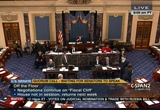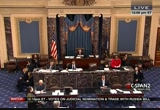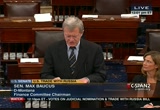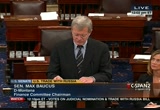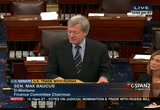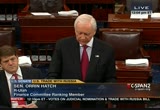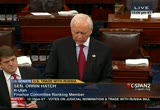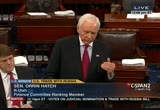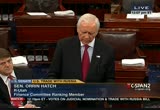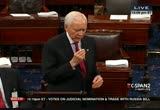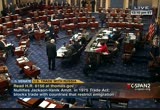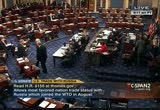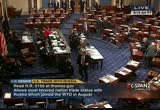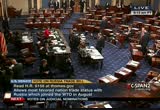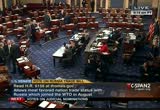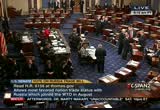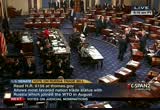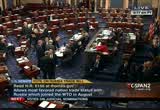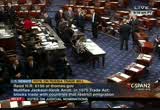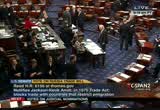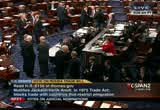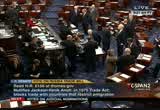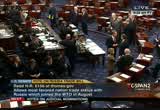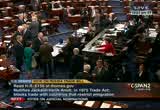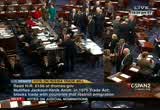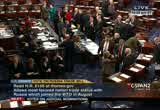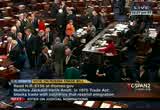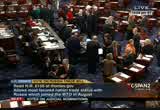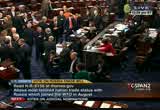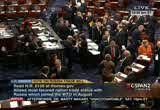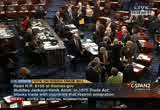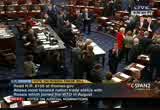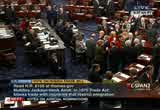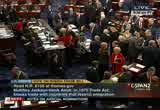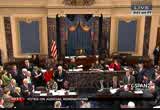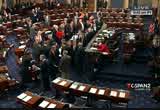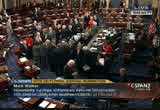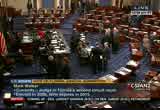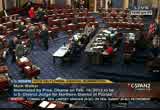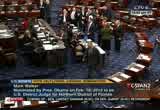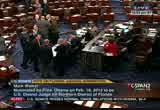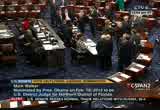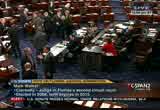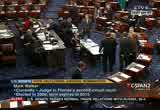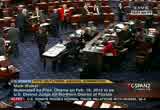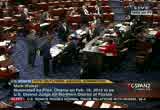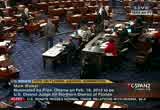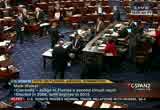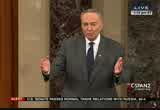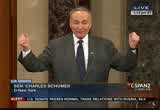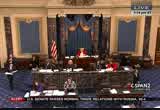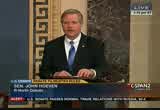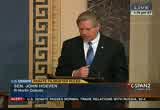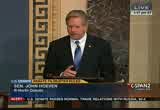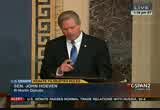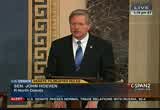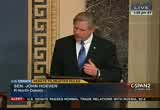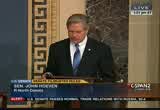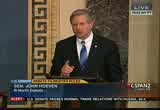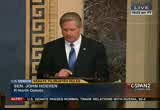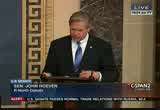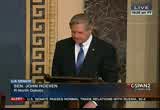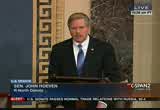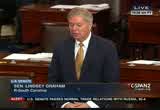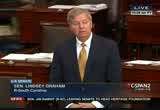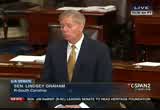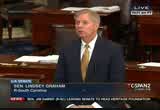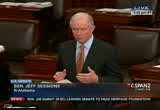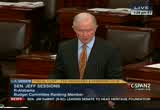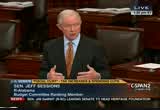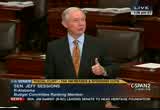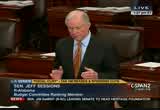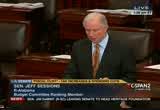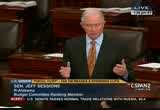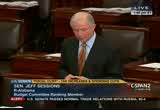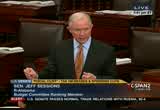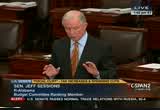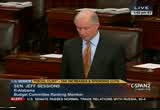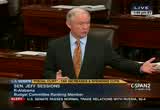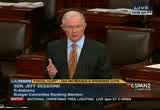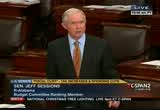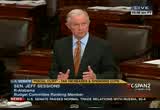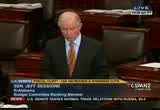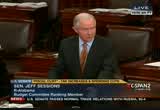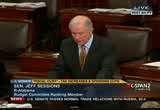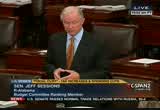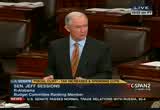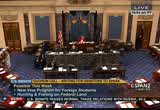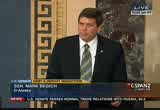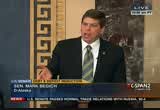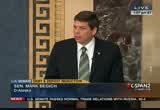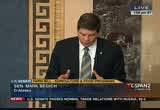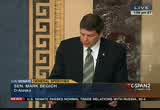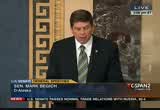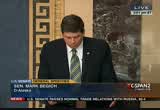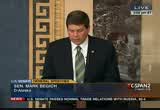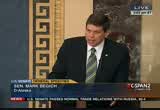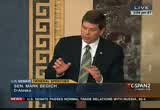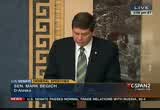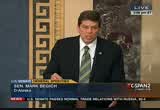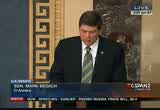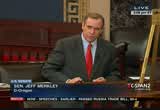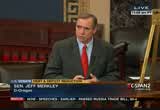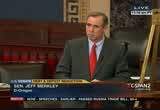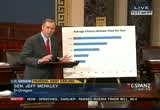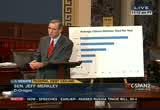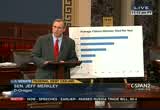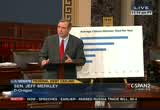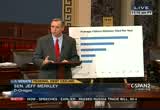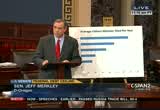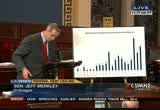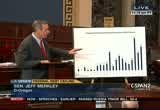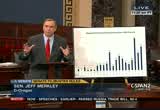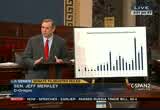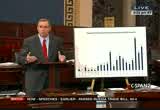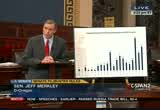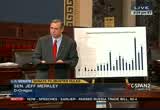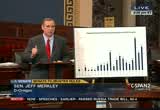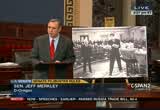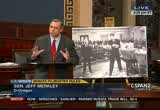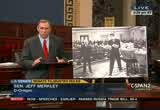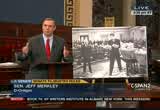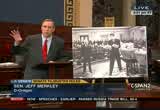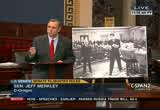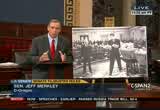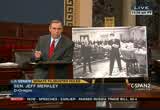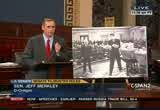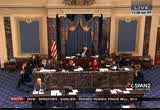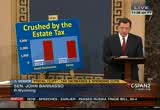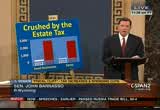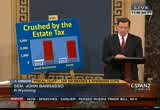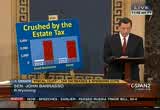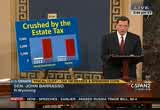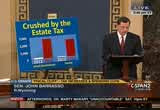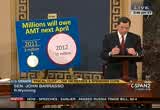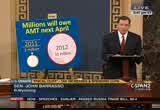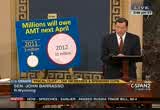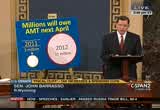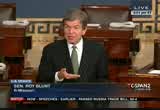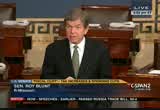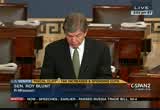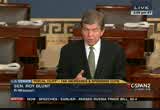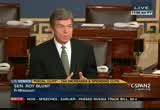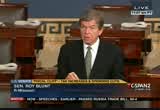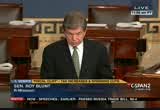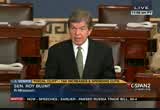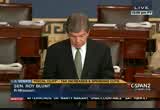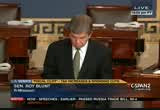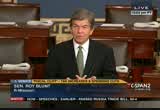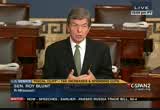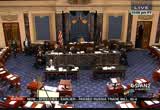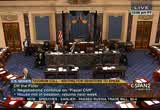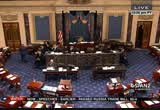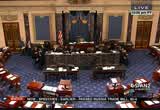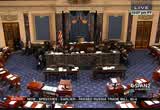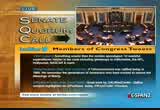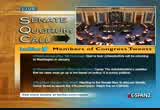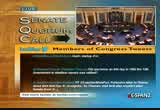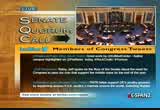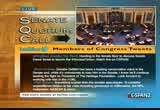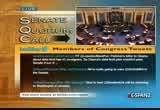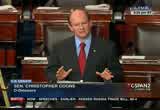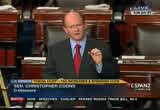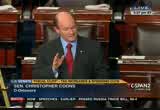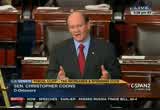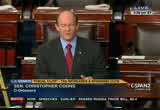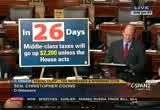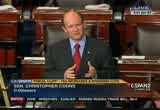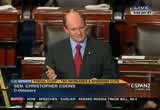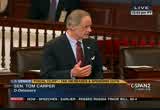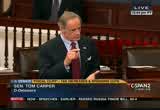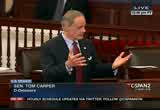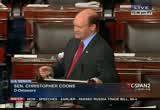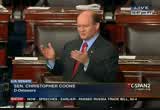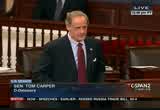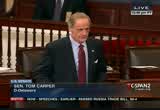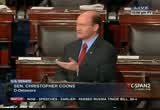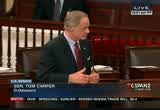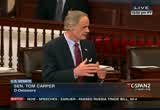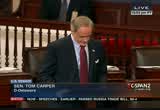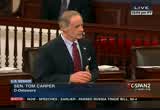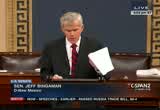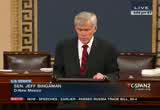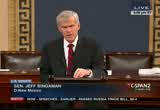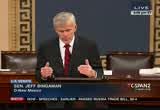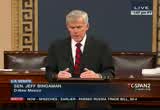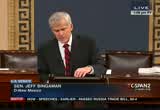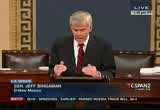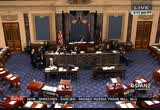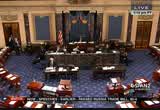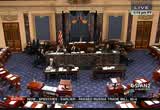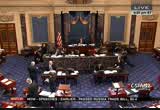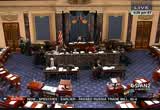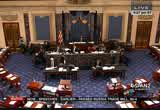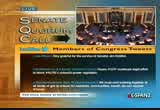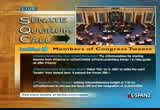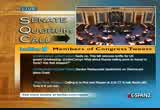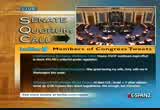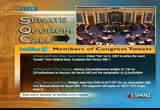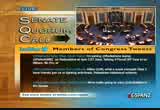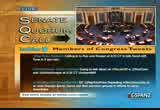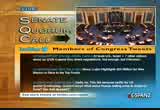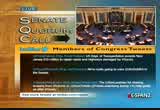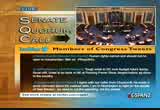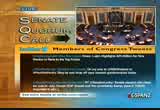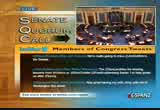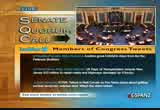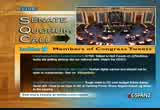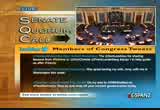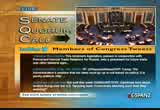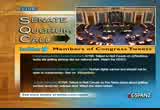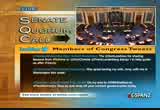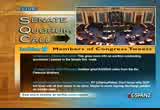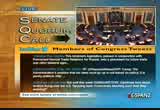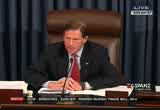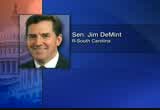tv U.S. Senate CSPAN December 6, 2012 12:00pm-5:00pm EST
quote
12:00 pm
mr. baucus: mr. president, i ask that further proceedings under the quorum call be dispensed with. the presiding officer: under the previous order, the senate will resume legislative session for the consideration of h.r. 6156, which the clerk will report. the clerk:
12:01 pm
federation and moldova and so forth and for other purposes. the presiding officer: under the previous order, there will be ten minutes of debate equally divide and controlled between the two leaders or their designees. mr. baucus: mr. president? the presiding officer: the senator from montana. mr. baucus: mr. president, we will soon be voting on whether to establish permanent normal trade relations, otherwise known as pntr, with russia and moldova and to update russian human rights legislation. we have to take many difficult votes in this chamber, but this is not one of them. in fact, this is a rare opportunity to pass a
12:02 pm
new jobs here at home. our competitors in china and canada and europe are not taking advantage of these opportunities because they have pntr with russia, they already have it. we are the only w.t.o. member missing out on these opportunities. if we now pass pntr, we can level the playing field and compete, and if we compete we will win. we sell more beef, we sell more aircraft, we will sell more trademarks, we will sell more medical equipment and our banks and insurance companies will grow. pntr will give our knowledge industries greater protections for their intellectual property and our farmers will have new tools to fight unscientific trade barriers. if we pass pntr, american exports to russia are expected to double in five years. this bill has strong enforcement provisions to help ensure that american farmers, ranchers,
12:03 pm
businesses and exporters get the full benefit of pntr. and this bill has strong human rights provisions. senator cardin's magnitsky act punishes human rights violations in russia and helps to address the corruption problems russia now faces. in july, the finance committee voted unanimously 24-0 in favor of pntr legislation, and last month the house of representatives passed pntr legislation now before us with 365 yes votes. now we need to act to pass this bill that supports u.s. jobs. let's take advantage of this opportunity, take a good vote on a good bill. i urge my colleagues to vote in favor of giving u.s. workers and businesses a chance to compete and vote in favor of pntr. i might add, madam president, i want to pretty much thank my colleague from utah, senator hatch, who is a very good
12:04 pm
person. we have worked very closely together. the two of us make a good team to get this legislation passed. mr. hatch: madam president? the presiding officer: the senator from utah. mr. hatch: i want to praise the distinguished chairman of the committee. he has done a wonderful job on this. of course it's been a pleasure to work with him. madam president, this bill marks an important step forward in our relations with russia and moldova. once this bill is signed into law, our workers, job creators and farmers will be able to take full advantage of russia and moldova's ascension to the w.t.o. -- accession to the w.t.o. the bill citrus strong enforcement provisions to ensure that russia lives up to its international trade obligations. finally this bill will help advance human rights and the rule of law in russia. today's vote would not be possible without the combined efforts of many dedicated public servants. first i would like to thank the staff at the office of the u.s.
12:05 pm
trade representative. many of them toiled for years to bring russia and moldova into the w.t.o., often at great personal sacrifice. i also would like to take a moment to thank my colleagues for all of their hard work in helping to craft this bill. an open and transparent dialogue was critical to our success. i would particularly like to again express my appreciation to all the members of the finance committee who worked with me and my staff to develop a strong package to develop many of the concerns we all have concerning our bilateral trade relations with russia. finally, i would like to thank my friend and colleague, senator baucus and his wonderful staff. i ask unanimous consent that we would put some names in the record before this is -- this is done because he and his staff have had a great willingness to work with us to make sure that our concerns were addressed in the bill. the process we undertook in the
12:06 pm
finance committee is emblematic of how the finance committee should work. it is my sincere hope that this would be a model for future legislation. working together, i am confident we can continue to develop policies to grow our economy through international trade and hopefully help advance the rule of law around the world. this is a good package that deserves our strong support. i urge -- i urge all of my colleagues to join in supporting this bill. i believe that we have got to do more in the international trade world. earlier, due to the efforts of the distinguished chairman, senator baucus and his staff and my staff, we were able to get the korean, colombian and panamanian treaties through. these were steps in the right direction after all these years.
12:07 pm
to have this happen is going to be a wonderful thing i think for our country and really for russia itself, and it certainly is going to help us go down the line in doing what's best for our own trade. one of the other special things that's in this is it's going to cause russia to have to live up to some international trade and international intellectual property laws, international laws, and we in this country believe in obeying those laws, and i have to say russia, india and china have invaded intellectual property in areas that they shouldn't have, but hopefully this type of an agreement, the pntr, will help alleviate that problem. so i urge my colleagues to join senator baucus and myself in voting for this very important bill, and again i want to thank staff on both sides for the wonderful work that they have done and the trade representative and his office as well for the wonderful work that they have done.
12:08 pm
i reserve the balance of my time. mr. baucus: madam president? the presiding officer: the senator from montana. mr. baucus: madam president, i thank the senator from utah. he is a good man. i also want to thank the top trade staff who helped put this bill together, amber cotell on my side and everett isanstatt who works for senator hatch, worked very hard. they lead very good trade teams, i might add, very, very talented people, obviously. i see this, too, as a vote to kind of help propel us to the next level of trade expansion. one is t.p.p., transpacific partnership which is being worked on by the united states and other asian countries. i think it's a big, dramatic opportunity for growth. second, working with europe, potential freight trade
12:09 pm
agreement with europe. a lot of interest in europe in joining with the united states in reducing barriers to trade. it's a great opportunity we should take advantage of, and obviously that raises another question, which is the trade promotion authority. the congress next year, i next year will work to get trade promotion authority passed so that we can conclude these trade agreements and help american companies and equally importantly help american consumers, because american consumers and american workers are frankly helped dramatically by a properly negotiated trade agreement when it's in the best interests of the united states. so, madam president, thank you very much for all that you do, too. i yield the floor. the presiding officer: who yields time? mr. baucus: madam president, i yield back our time. mr. hatch: and i am pleased to yield back our remaining time
12:10 pm
and ask for the yeas and nays. the presiding officer: is there a sufficient second? there appears to be. the yeas and nays are ordered. the clerk will read the bill for a third time. the clerk: calendar number 552, h.r. 6156, an act to authorize the extension of nondiscriminatory treatment, normal trade relations treatment to products of the russian federation in moldova, and so forth and for other purposes. the presiding officer: under the previous order, the question occurs on passage of h.r. 6156. the yeas and nays have been ordered. the clerk will call the roll. vote:
12:39 pm
the presiding officer: are there any senators in the chamber wishing to vote or change their vote? the yeas are -- the yeas are 92, the nays are 4. the bill is passed. the majority leader. may we have order in the chamber, please. the majority leader. mr. reid: madam president, this morning senator mcconnell, as we do a lot of the time, came to the floor. senator mcconnell made a serious offer dealing with the debt ceiling of this country, one of the most important issues facing the country. it's a serious offer.
12:40 pm
i personally haven't read it. my staff has looked at it. and it's important enough that i would like to have a vote on it this afternoon, but we have to -- i need to have a caucus, explain to my troops what this is all about. and i'd like to do that. so everyone here, if we can work something out with senator mcconnell, i'd like to have a vote sometime this afternoon. i do need to have a caucus. i set that for 1:30. we have another vote right now. and if my republican colleagues think there's not a chance of having the vote this afternoon, i can only do it by unanimous consent, and if someone is going to object to it, they should do it now, and we'll arrange another time to address this issue. so the issue is, everybody, senator moc mcconnell has made a proposal on how we handle the
12:41 pm
debt ceiling, and we have to get permission from my republican colleagues whether we can have a vote on this this afternoon at a time that would be as convenient as possible. i don't think we need a lot of time to fate it. we've done that over the years lots of times. a senator: how about 1:00? mr. reid: well, i have to -- i know there are airplanes that people want to leave on. but this is very, very important, madam president. and i have to have my -- this vote will end about 1:00. i scheduled -- i've scheduled the caucus for 1:30. there's no reason we couldn't start the caucus at 1:05, move it up, everybody. eat your lunch a little faster, whatever you're going to do. but i do need some direction from my republican colleagues. so if i hear no one yelling
12:42 pm
"no," then we'll go ahead and schedule as soon as we can this afternoon a vote. the presiding officer: the senator from texas. mrs. hutchison: could i ask the majority leader -- the presiding officer: may we have order in the chamber, please. take your conversations out o c. mrs. hutchison: i know there are those on my side that would also like to have a conference to talk about this. would you give us an indication, though, because people obviously would like to be able to plan, a time frame of a vote that might give us both time to talk, if we start at 1:00 and then move on? mr. reid: madam president, through you to my friend from texas, the conference we're going to have won't take very long -- half-hour, 45 minutes. so we could finish that, i'm sure, by 1:45 i'm sure and we could have a vote by 2:00 i'm sure. mrs. hutchison: thank you, madam president.
12:43 pm
1:06 pm
the presiding officer: by a vote of 94-0, the con tpeurplgs of mark -- the confirmation of mark warner of florida to be u.s. judge of florida is confirmed. the question now is on the nomination. all those in favor say aye. opposed no. the ayes appear to have it. the nomination is confirmed. under the previous order, the president shall be immediately notified of the senate's action. the senate shall resume legislative session. mr. reid: madam president, i now ask unanimous consent that at 1:30 p.m. today, the senate proceed to the consideration of s. 3664, which is a bill regarding debt limit increase, the text of which is at the desk, that there be no amendments in order to the bill, that there be up to ten minutes of debate equally divided between the two leaders or their
1:07 pm
designees, that upon the use or yielding back of that time, the bill be read a third time, the senate proceed to passage of s. 3664. the presiding officer: is there objection? mr. mcconnell: madam president, reserving the right to object. what we're talking about here is a perpetual debt ceiling grant in effect to the president. matters of this level of controversy always require 60 votes. so i would ask my friend, the majority leader, if he would modify his consent agreement to set the threshold for this vote at 60. mr. reid: madam president? the presiding officer: the majority leader. mr. reid: reserving the right to object, but what we have here is a case of republicans here in the senate once again not taking yes for an answer. this morning, the republican leader asked consent to have a vote on this proposal. now i told everyone that we are willing to have that vote, up-or-down vote. now the republican leader objects to his own idea. so i guess we have a filibuster of his own bill, so i object. the presiding officer: is there
1:08 pm
objection to the original request? mr. mcconnell: i object. the presiding officer: objection is heard. mr. durbin: madam president? the presiding officer: the minority leader -- the assistant majority leader. mr. durbin: madam president, what just transpired deserves a word. senator mcconnell came to the floor this morning and offered a change in law that would help us avoid the kind of obstruction and the kind of showdowns that we have had in the past over the debt ceiling. in fact, the idea was not new. it was his original idea that has been the law of the land and followed. and he offered and challenged senator reid to bring this matter for consideration in the senate. senator reid just agreed to it, said he would bring this for a vote in 20 minutes and we would decide up or down whether the debt ceiling problem would be
1:09 pm
resolved once and for all under senator mcconnell's proposal. and then senator mcconnell objected, objected saying no, no, we need 60 votes. for those who don't follow the senate, 60 votes is the equivalent of a filibuster vote, breaking a filibuster vote. so this may be a moment in senate history when a senator made a proposal and when given an opportunity for a vote on that proposal filibustered his own proposal. i think we have now reached a new spot in the history of the senate we have never seen before. i'm going to ask the parliamentarian to really look into this. i don't think this has ever happened before, but it really calls into question whether or not this was the kind of offer that one would consider to be good faith. if senator reid offered a vote on it and senator mcconnell said no. it has to be 60. it has to be filibuster-proof vote. ms. stabenow: i would ask my colleague to yield for a question. the distinguished majority floor leader. is it also correct that basically if we had voted, we
1:10 pm
would have guaranteed that we would not place the country again in a situation of defaulting on our bills. we would send a message that we can work together, that the fact that we were willing to accept the republican leader's proposal and be willing to send a message that as -- as a senate, that we want to make sure we have fiscal stability, that we're paying our bills, that this would be one step forward in making sure we can resolve the fiscal issues for the country? isn't that your -- isn't that your view of this as well that, in fact, it would be an important message about stability? i also have to say i share your -- your amazement that the leader would, in fact, object to his own proposal and now be filibustering his own proposal that we were willing to accept as a bipartisan good-faith
1:11 pm
effort for the country. didn't he really just take us in the wrong direction? mr. durbin: in response to the senator from michigan, the republican senate leader, senator mcconnell, has such a strong appetite for the filibuster that we have seen 386 or 387 filibusters in the last six years, and now he has decided another good idea is to propose a bill and then filibuster your own bill. i do believe that's history in the making, but that's why this appetite for the filibuster in the senate has to change. what an abuse that we can't have a majority vote on something the republicans proposed and the democrats were prepared to vote for. this would have been a true bipartisan measure. good news, maybe lead the news across america. it really is unfortunate. mr. schumer: would the minority leader yield? mr. reid: madam president? i have some business here. you will get the floor right back. madam president, i now move to proceed to calendar number 554, s. 3637. the presiding officer: the clerk
1:12 pm
will report the motion. the clerk: motion to proceed to the consideration of calendar number 554, s. 3637, a bill to temporarily extend the transaction account guarantee program, and for other purposes. mr. reid: madam president? the presiding officer: the majority leader. mr. reid: 387 is on its way. i have a cloture motion at the desk. the presiding officer: the clerk will report the motion. the clerk: we the undersigned senators in accordance with the provisions of rule 22 of the standing rules of the senate hereby move to bring to a close the debate on the motion to proceed to calendar number 554, s. 3637, a bill to temporarily extend the transaction account guaranty program, and for other purposes. signed by 17 senators -- mr. reid: i ask unanimous consent the reading of the names be waived. the presiding officer: without objection. mr. reid: i ask unanimous consent that the mandatory quorum under rule 22 be waived. the presiding officer: is there objection? without objection. mr. schumer: madam president? the presiding officer: the senator from new york. mr. schumer: madam president, we
1:13 pm
saw what happened here, the minority leader filibustering his own bill. he should have trusted his first instincts. imagine if we would have passed the minority leader's resolution. the markets would have been jubilant. stocks would have gone up. one of the great specters hanging over our economy that we wouldn't raise the debt ceiling would have greatly mitigated in terms of damage and danger, and we could move on to the real issues of dealing with the fiscal cliff and dealing with our debt situation and not have a debt ceiling hanging out there as a diversionary but dangerous issue. but for some reason, inexplicable, the minority leader, the republican leader, changed his mind. now, he said on the floor well, important measures deserve 60 votes, but when he brought it up earlier, he acted as if he was in favor of it, he was offering
1:14 pm
it. and now, of course, essaying no, he's going to object to his own resolution. i wish he would reconsider. again, playing -- using the debt ceiling as leverage, using the debt ceiling as a threat, using the debt ceiling as a way to achieve a different agenda is dangerous. it's playing with fire. and yet, with the opportunity to take that off the table, reassure the markets, the minority leader blinked. i don't know why. it's hard to figure out the strategy that he's employing, but we would hope on this side of the aisle -- and i think i speak for all of us -- that he would reconsider and perhaps early next week let us vote on his own resolution. i yield the floor.
1:15 pm
mr. schumer: i notice the absence of a quorum. the presiding officer: the clerk will call the roll. a senator: madam president? the presiding officer: the senator from north dakota. a senator: i ask that the quorum call be suspended. the presiding officer: without objection. mr. hoeven: madam president, today i would like to speak on several important issues pending before the senate, issues i believe that are related. i want to speak first about the recent proposal to change the rules of the senate with a simple majority vote. second and related, i want to talk about the need for consensus and bipartisanship to address our nation's pressing challenges; specifically, the fiscal cliff that we face. we must and, in fact, we can find consensus and agreement.
1:16 pm
we've done it before. we've done it in building a good, solid farm bill which actually found $23 billion in savings towards the deficit. we did it in passing a strong highway bill that will strengthen our nation's infrastructure. and we did it most recently this week in working through a large and complex defense authorization bill that will keep our nation safer and more secure in these perilous times. it will take more of this kind of cooperation and consensus building to address the very real and substantial challenges facing our nation today. that is why i'm deeply concerned about a proposal floated recently by some members of the majority regarding the rules of the senate. they propose to change the nearly 100-year-old senate rule that requires a two-thirds majority to change the operating rules of the senate. our colleagues in the majority are proposing to use a simple
1:17 pm
majority vote to make the change. that's the issue here. the issue is the manner in which they plan to do it. once the precedent of changing a rule with a simple majority vote is established, 51 senators could change the rules to suit their own convenience. in other words, they want to break the rules in order to change the rules. that would be a big mistake. that would be, as the majority leader himself said in his own book, the death of the senate. votes that require a supermajority serve a very valuable function in the senate. they encourage consensus. they encourage bipartisanship. and they make certain that the minority has a voice in the lawmaking of this body. in recent history, both democrats and republicans have held the majority.
1:18 pm
in fact, it wasn't that long ago that the democrats themselves were adamantly opposed to changing the rules of the filibuster. they argued that doing so could bring an end to a century-old tradition of bipartisan consensus building in the united states senate and diminish the influence of minority voices. and the reality is, we are now at a point in our history when bipartisan -- bipartisanship and consensus is exactly what we need. laws passed by a narrow majority will only fuel greater partisanship and greater divisiveness. we need both parties working together so that when we're done, we can say, this is a plan that the american people agree on. that's the kind of approach we need to address the economic challenges that are posed by the fiscal cliff. we need bipartisanship and we need consensus building. with bipartisan consensus, i
1:19 pm
believe we can avert the fiscal cliff looming before us and put our nation on a sustainable fiscal path. to do anything less could put our nation and our future at risk. in little more than a month, nearly $400 billion in tax increases will combine with sequestration, more than $100 billion in mandatory across-the-board spending cuts over one year, to drag our nation over the so-called fiscal cliff. what those tax increases mean to an average american family of four earning $50,000 a year is over $2,000 in higher income taxes. add to that expiration of the alternative minimum tax patch, new taxes mandated by the federal health care bill, and the reinstatement of the death tax, which will impact the next generation of farmers, ranchers, and small business owners, which americans will see the largest tax increase in the history of
1:20 pm
our country. if all of this happens, the congressional budget office predicts the nation's economy will shrink next year and the unemployment rate could rise again. in other words, we go back into recession. i believe we can avoid the fiscal cliff and address our massive deficit but that requires doing three essential things: reforming our tax code, reforming entitlement programs, and better controlling our spending. we can get additional revenue by reforming our tax code. that means closing loopholes and limiting deductions. by closing loopholes and limiting deductions, we can make the tax code -- tax code simpler and fairer to stimulate growth in our economy. markets get the kind of certainty they need to invest, to grow and to hire. it's a growing economy, a
1:21 pm
growing economic base that creates more jobs and revenue, not higher taxes. the simple fact is, we must make america a great place to do business again. our pro-growth strategies in my home state of north dakota have broadened our economic base and raised revenue without raising taxes. that has resulted in the lowest unemployment rate in the nation. growing personal income and rather than a deficit, a budget surplus. in addition to pro-growth tax reform, we also need to start a fair and thoughtful process to reform entitlement programs. if we don't, they won't be sound and solvent for future generations. for example, medicare's hospital services program is in serious financial trouble. in a report this spring, the medicare trustees cautioned that the trust fund that covers the program's hospital services will be depleted and consequently
1:22 pm
insolvent by 2024. the fact is, we can accomplish entitlement reform in a way that doesn't change programs for people at or near retirement yet ensures that those programs will be there for our children and grandchildren down the road when they need them. republicans and democrats should be able to come together, as should older and younger americans, because thoughtful entitlement reform is in everybody's interest. and, finally, we need to control our spending. our federal deficit for the fiscal year 2012 was $1.1 trillion, and our national debt is now more than $16 trillion. that is unsustainable. more revenues from tax reform and economic growth combined with entitlement reform and controlling spending will reduce our deficit and our debt, and there is no question that we can
1:23 pm
do it. for example, we can help make a down payment on our deficit reduction right now just by passing the farm bill that we've put together in this chamber. the farm -- the farm bill version we passed with broad bipartisan support in the senate would save $23 billion over ten years. the house version, which has been passed out of committee and is now pending on the floor, would save $35 billion. passing a good farm bill can be part of the solution to the fiscal cliff. the reality is, solving our nation's fiscal problem is achievable. we can find real budget savings in a far more thoughtful way than doing it through sequestration. reforming our tax code, reforming entitlement programs, and better control of our spending will work. add a measure of good-faith bipartisanship and we can get
1:24 pm
our nation growing again and we can get people back to work. for the sake of our country, we need to do it and we need to do it now. madam president, i'd like to address one other matter. i rise today to honor the lives of two north dakota soldiers who were killed in action on monday, december 3, in southern afghanistan while serving in support of operation enduring freedom. sergeant first class darren m. lindy and specialist tyler j.orguard were both members of the north dakota national guard assigned to the 818th engineering company. their unit has been tasked with an important but dangerous mission. they were conducting a route clearance operation when their vehicle struck an i.e.d. on monday, fatally injuring both men and wounding specialist ian placek, who is currently
1:25 pm
undergoing medical treatment in germany. and we pray for his full recovery. today we honor the lives of sergeant first class lindy and specialist orguard. our thoughts and our programs arour prayers arewith their fams as well. sergeant first class lindy of devil's lake, north dakota, led a distinguished military career since enlist not guilty the north dakota national guard in 1990. during the course of his career, he served with the north dakota national guard as well as the united states army and the montana national guard. he earned several recognitions for his valor, including the bronze star medal, purple heart, army commendation medal and army good conduct medal. since 2009, he worked as a full-time instructor with the north dakota national guard's 164th regional training institute camp grafton training center in devil's lake. sergeant first class lindy was a devoted and selfless leader as
1:26 pm
well as a committed family man. he enjoyed spending time with his family and friends. and he is survived by his wife adrienne and four children. specialist tyler orguard of bismarck, north dakota, joined the north dakota national guard shortly before his 2011 graduation from bismarck century high school, where he was a member of the century patriots wrestling team and began competing in the impact fighting championships. he was passionate about training in mixed martial arts and his family and friends knew him to be an extremely disciplined, hardworking man who served his country with great pride. this was specialist orguard's first overseas deployment. for his commendable service, he has been awarded the bronze star medal, purple heart, army good conduct medal, and national defense service medal. specialist orguard is survived by many loving friends and family, chug his parents, josephine and jesse orguard.
1:27 pm
for the service and sacrifice of these brave men, we offer our thanks. we pledge to honor their lives through our commitment to supporting our troops and veterans and by remembering their lives of service. my wife, mikie and i also join our fellow north dakotans and americans in extending our deepest sympathy to the families of sergeant first class lindy and specialist orguard. we recognize that these men have made the ultimate sacrifice in defense of our nation. we will remain forever grateful for their selfless service and commitment to defending the principles of liberty and justice that continue to guide our country. may god bless and continue to watch over their families. madam president, i yield the floor. the presiding officer: the senator from south carolina. mr. graham: thank you. i'd like to be recognized for ten minutes and talk about the decision by senator demint to
1:28 pm
leave the senate next year. but, one, i would like to say to my friend from north dakota, all of us have in our prayers the loss of your soldier there and all the soldiers. it's been a tough, long, hard war. but, madam president, i met with jim demint this morning and to say i was stunned was an understatement. jim indicated to me that he will be retiring from the senate next year and taking over the presidency o of the heritage foundation, one of the great conservative think-tanks here in washington. my reaction for the people of south carolina is you've lost a great, strong, conservative voice, someone who has championed the conservative cause and represented our state with distinction, sincerity and -- and a great deal of passion. on a personal level, i've lost my colleague and friend. jim and i've known each other for almost 20 years now and i think we've done a pretty darned good job for south carolina. at times playing the good cop, the bad cop, but always -- always trying to work together.
1:29 pm
and what differences we've had have been sincere, and that's the word i would use about senator demint. he sincerely believes in his cause. he's a -- he sincerely believes in his causes. he's a sincere voice that people in our party look to for leadership and guidance. what he's done over the last four years to build a conservative movement, to get people involved in politics, like marco rubio, who jim helped early on in his primary i just think is going to be a great legacy. from a state point of view, we have lost one of our great champions. but he and debbie, jim and debbie have raised four wonderful children. they got great grandkids, and i know jim is looking forward to staying involved in pushing the conservative cause outside the body. he was an effective voice in the senate, whether you agreed with jim or not. he really did strongly and passionately advocate for his positions and did it very
1:30 pm
effectively. jim made the republican party, quite frankly, look inward and do some self-evaluation. conservatism is an asset, not a liability, as we try to govern this country in the 21st century. and i look forward to staying in touch with jim and to working with him at the heritage foundation to see what we can do to improve the fate of our country so we will not become greece. no one is more worried about this nation's unsustainable debt situation than senator demint. i've seen him deinvolve over time to someone who could just not sit quietly, who had to take up the cause. in the 2010 election cycle, he was one of the strongest voices this he had would a lost our way -- that we'd lost our way in washington. jim is a kind, sincere man, an individual who is a joy to be around. when it comes to what's going on in america, jim understands that
1:31 pm
if we don't make some changes we're going to lose our way of life. that's what's driven him above all else, to try to keep our country a place to be place where you can be anything. i look forward to working with jim in the private sector. from a personal point of view, we've had a great ride together. it has been fun. it has been challenging, and i think we put south carolina on the map in different ways at different times, and to people back in south carolina, i hope if you get to see jim anytime soon, just say "thank you." because whether you agree with him or not, he was doing what he thought was best for south carolina and the united states. at the end of the day, that's as good as it gets. because if you're doing what you really believe in and you're not worried about being the most popular and people getting mad
1:32 pm
ought, then you can really do a good job in washington. to the people back in south carolina, everything jim has tried to do has been motivated about the changing the country. if you get a chance to run into him anytime soon in the coming day, please just say "thank you" because he did his job as he saw fit. he did what he thought was best and he didn't worry about being the most popular or taking on people when he thought he was right. i can tell you this, when it comes to me, he has always been a friend, somebody i could count on. personally we've really enjoyed our time together, and i just -- i was stunned this morning. but jim has an unlimited, bright future in the private sector, and i will say more next year when his time comes to an end.
1:33 pm
but on behalf of all of us in south carolina, i want to say to jim and debby, thank you very much for taking time away from your family, fighting the good fight, pressing issues that you passionately believe in, and i want to thank jim and debby both for being my friend. y'all both mean a great deal to me, and i am just confident the best is yet to come for both of you. on behalf of the people of south carolina, great job, well done. i yield. mr. sessions: madam president, i want to associate myself with lindsey graham, senator graham, and say how much i've appreciated working with jim demint. he is courageous, determined, principled, he has a vision for america, and he's advocated for
1:34 pm
it every single day, and he stood up sometimes alone to advocate for those views, and he's smart, and is he's intellt and he's work. and it's been my pleasure to work with him and to support him. i've the countriesly felii havet his values were good. sometimes you have to rock the boat. and he was willing to do that. and i so much have enjoyed working with him. madam president, i wanted to share a few thoughts, as rank member on the budget committee, concerning the proposal that the president has made through secretary geithner toward fixing the fiscal cliff that's been so
1:35 pm
much talked about. and i just want to say, sadly, that the facts are that real numbers disprove what they have alleged the plan would do. and we've look the at the numbers. there's no real mystery about this. and there are gimmicks and manipulations in the way they've expressed what they intend to accomplish that i think are beyond the pale and the american people need to know that it's not accurate. this would not be possible if we had the plan on the floor so it could be voted on in the light of day. but we all know what the plan is, the scheme is, the strategy is. it is to be meeting in secret, and then plop down on the floor of the senate at the last hour
1:36 pm
some sort of coerced agreement that all the senators, like lemmings, are supposed to vote for. and we're supposed to expect that the american people will believe the agreement is what the president says it is, but that is not in reality what's occurring. he's been -- secretary geithner -- meeting with senate -- house members, particularly last week. he presented a proposal, and he made a number of claims. he says the proposal -- secretary geithner did -- will fix our debt. he says his proposal will make our debt -- quote -- "stable and sustainable." both of those are not true. he also claimed that his proposal contains $2 in spending cuts for every $1 in tax
1:37 pm
increases. not so. secretary geithner has been around a while. he knows these numbers aren't accurate, and it is disappointing to me to see him come in with so much bluster yesterday, being interviewed and we're going to go off the cliff unless republicans agree to what we demand, and we're -- we can't have a debt ceiling anymore; that causes controversy to have to debate that. we don't want a debt ceiling anymore. and those, basically, as i heard him, hubris stuc hubristically . he asked for $800 billion in the campaign. now he wants $1.6 trillion in new taxes. so far -- even with $1.6
1:38 pm
trillion in new taxes, more than $1 trillion are there in spending increases, and far from fixing our debt, our debt will grow over the next ten years by nearly $9 trillion. that's almost $1 trillion a year, on average. and it goes up in the last number of years, so we remain on an unsustainable course when our debt is continuing to surge out of control. we're projected, based on our debt, now to have our interest payment on the money we've borrowed exceed the defense budget in just 2017. these are -- these are facts. spending under that plan will increase $1 trillion above the levels agreed to in the budget control act, as signed as part of the budget deal.
1:39 pm
so we have the budget control act 18 months ago in august and we raised the debt ceiling and agreed to reduce spending. raise the debt ceiling $2.1 trillion, agreed to reduce spending $2.1 trillion. so this would take out over $1 trillion of those spending limitations that are in current law. so i'll repeat, spending will increase more than $1 trillion above the already-projected growth in spending. our spending is growing. it's not going down. it's projected to grow, but the president's proposal is to have it grow even faster than we're currently -- than the law currently calls for us to increase spending. so i don't believe these numbers that i've expressed can be disputed. you cayou can spin and you can y things and mix up baselines and confuse the american people, but
1:40 pm
the plan, as he has outlined, does just that. it's not much different from the budget the president submitted in february of last year. as a matter oas a matter of facy similar to it. what did that budget do? it cap an increased taxes and id spending. this is the kind of path that we're being asked to walk on. i don't think the american people would share that. there are other increases in spending other than the elimination of the $1.2 trillion sequester cuts that are -- were agreed to last year. for instance, more than $170 billion has been -- in new spending arises from new stimulus extended spending. and there is an unpaid-for
1:41 pm
increase in medicaid reimbursements, the doc fix, almost $400 billion that's not funded and will have to be funded. and they've ignored -- they left out of the budget which makes it look $400 billion than it is. you have to count that money. together, those almost $1.8 trillion in new spending, but the only cuts that the white house offers are $600 billion in mandatory spending reductions, basically cutting the providers of medicare it appears to us. in other words, the doctors and hospitalhospitals who are alreao fund obamacare will now be asked to take another $600 billion in cuts. and they tell the seniors, don't worry. we're not cutting your medicare. oh, we're just going to cut providers. but at some point, we have to understand that these reductions to providers can damage their
1:42 pm
ability to provide care. a hospital has to stay open, doctors have to make a living, a lot of them are considering retiring early because it's so difficult to operate under federal programs. so the bottom line is that the proposal that's put out there is a huge tax increase, $1.8 trillion now they're saying, and its -- the money is being gobbled up with new spending. madam president, to try to be precise and to operate from a known spending baseline -- that is, the budget control act
1:43 pm
baseline we agreed to 16 months ago -- the president's plan clearly contemplates this: the $1.2 trillion in sequester cuts would be eliminated. that's more than half the cuts we agreed to last year. they would be eliminated. there would be other -- the medicare reimbursement cuts of $600 billion would b be reducing spending. that would mean the next -- net spending has gone up $600 billion. and the doc fix that i just mentioned is another $400 billion, so it adds $is trillion. there's about $200 billion in stimulus spending, and that's over $1 trillion. and you have an $800 billion tax increase. if you got that, which he
1:44 pm
originally asked for, and you would end up with more debt than if we dints have the $800 billion tax increase. if he gets $1.6 trillion in new taxes, which won't happen, in my opinion, if he were to get that, it would reduce the debt -- two-thirds of that money, plus -- maybe three-fourths, would be used to fund new spending and only one-fourth to deal with our current chasms so challenges. so i would ask the american people, when you read that congress was considering -- and you've heard the president advocate -- more taxes, did you not assume that that money would be used to reduce the deficit we have? so that we put our country on a sound financial path? or did you at least not consider and assume that it would be used maybe to save social security, which is already drawing money from the general treasury, so we
1:45 pm
have enough known pay recipients? or did you not assume that maybe the money was going to be used to strengthen medicare and keep that program on track so it won't go into bankruptcy? was any of that done -- is any of that done by the president's program? no. he proposes no fix to social security, no fix to medicare, and no real reduction in debt. in fact, if we ended up with a $1.6 trillion in tax increases, over ten years we can expect that the deficit would go up about $8.6 trillion instead of $9 trillion. that would be the impact on it. because most of the money, the new money that that he would beg is to fund new spending. so i'm worried about this. i don't think that the leader of our nation, the one person
1:46 pm
elected by all the people, should be laying out a program to the american people that does not honestly deal with the debt threat that we have that, does not honestly lay out to the american people how we're on an unsustainable course, as every expert has said. it does not honestly talk with the american people about why medicare is in trouble, why social security is in trouble and what we need to do to fix it. our president won't even talk about that. and when somebody talks about it in a serious way to fix those programs, they get attacked by the white house. and this new budget doesn't do anything about it either. i think this is not good leadership, and i hope and i know senator mcconnell and speaker boehner have pleaded with the president to talk about these long-term systemic
1:47 pm
problems. social security, medicare, medicaid and interest on the debt is almost 60% of what we spend in this country, and they are growing at three times inflation rate. this is unsustainable. this is what erskine bowles, the man the president chose to head his debt commission, has warned us about. in fact, the house proposal that indicated they would accept an $800 billion tax increase was a good-faith attempt to reach out to the president based on what mr. bowles has said. they basically call it the erskine bowles plan. that's what he suggested. how the tax rates wouldn't go up, but the deductions would be eliminated. he would have a simpler, more
1:48 pm
flat tax system. you would bring in $800 billion more in revenue. they would use this revenue to help reduce our deficit. that's the kind of plan that's serious. but the president has hammered the house plan. secretary geithner says it is unacceptable. but it's erskine bowles' plan, that's what it was. it was a serious good-faith attempt to reach out and deal with this crisis. i don't believe we need tax increases in it, but if we do we have to ask ourselves where are we going to apply them? what are we going to do with them that puts the country on a sound path for the future so our children are not having ever larger amounts of debt accruing every month, every year that goes by. so again, if the president's plan were accepted and the $1.6
1:49 pm
trillion in new taxes were imposed, which i don't believe will happen, you would have virtually no reduction in the total debt accruing over ten years. maybe $9 trillion now, maybe $8.6 trillion. that does not change the debt course of america. that does not deal with the danger we have. the spending rate we're on is in the red zone. the tachometer spending needle is over in the red zone. mr. bowles told us at our budget committee hearing two years ago that we are facing the most predictable debt crisis in our country's history. he said you've got to get off this unsustainable path. his plan, the house basically has taken his suggestions and
1:50 pm
worked with it. and i understand that earlier today there was a discussion about raising the debt ceiling. the constitution clearly gives the congress the power to regulate the debt of america. and we have to pass legislation to raise the amount, the ceiling, the limit on how much we can borrow. and we're at $16 trillion-plus now and we're about to reach the debt limit again early next year and the president doesn't want to have to deal with that again, because last time we had a debt ceiling limit reached, august a year ago, the president had to reduce spending. the only time we've actually done anything, we reduced spending by $2.1 trillion out of what was projected to be $47
1:51 pm
billion -- trillion to be spent. so august a year ago the country was on track to spend $47 trillion over the next ten years. at that current rate we were spending $37 trillion. once the agreement was reached and $2.1 trillion was saved, we were on a course to spend $45 trillion instead of $47 trillion. america is not going to shrink into the ocean if we reduce spending that much. it's still an increase, a very substantial increase. debt would have accrued over the next decade. instead of $11 trillion, it would increase $9 trillion. we go from $16 trillion to $25 trillion, $26 trillion in new debt to the country. that's all that limit did. i felt it did not go nearly far enough, and that was a concern of mine. but that was at least that step. the president's plan eliminates that sequester and does not pay
1:52 pm
for it by cuts elsewhere. it actually increases spending because it backs off the agreement we reached just last year. so, madam president, i believe the american people have a right to be unhappy with us. and it absolutely is not true that if we take the current law baseline that the president's proposal cut spending $2.50 for every dollar of tax increase. in fact, there is no spending reductions really. there is only spending increases. no reductions, net reductions properly accounted for occur in the plan secretary geithner laid out. that's true with his budget too. the budget the president submitted last year, it's very
1:53 pm
similar to it. increases spending, doesn't reduce spending. so we need to know that we're being asked to permanently raise tax rates in america and permanently use that money to new spending programs leaving social security, medicare, medicaid, the defense department on the same dangerous course they're on today. i think like we can do better. i hope the american people will look at these numbers, maybe call the white house, call their members of congress and say, look, if you have to raise taxes, i think most americans don't think we need to. but if we do have to raise them, be sure you use this money wisely. don't start new programs when we're going broke now. don't start new programs when we don't have money to fund social security, don't have money to fund medicare, don't have money to fund medicaid. don't start new spending programs when we haven't the
1:54 pm
1:55 pm
senator from alaska. bench bench are we in a quorum call -- mr. begich: are we in a quorum call? the presiding officer: we are. mr. begich: i ask unanimous consent the quorum call be vacated. i have three unanimous consent requests for committees to meet today. i ask unanimous consent these requests be agreed to and these requests be printed in the record. the presiding officer: without objection. mr. begich: madam president, before i speak on the subject matter of a bill i submitted for introduction protecting and preserving the social security act, i want to make comments on two issues. one was what we saw earlier today on the debt ceiling debate or discussion. it was somewhat frustrating because at one point there i thought for sure we were going to vote on a debt ceiling issue that would bring certainty and some predictability to the markets and to the economy and not hold that issue hostage, as was done a couple of years ago by some and some that are
1:56 pm
threatening it today to hold the good credit debt of this country hostage in these debates on the budget. as the minority leader came forward and proposed an idea which seemed like a pretty good one to me, and it obviously was a pretty good idea to him because he brought it forward, and as many of us know -- and i've only been here four years but from my understanding of history, when a debt ceiling issue comes in front of us as a single item it's only required 50 plus 1 vote. for the first time i can recall since i've been here and prior to me, they changed the debt midway through. they said we didn't mean that. didn't want to deal with the debt. we told you we did, but we didn't. so we're going to make you have a 60-vote threshold. i've got to tell you, people back in alaska are fed up with these kinds of games. this showmanship to try to one up the other side. on this debt issue, once again, here was a chance to do
1:57 pm
something to create certainty, predictability in the markets for the next several months and ongoing and ensuring that the markets would not have to worry about our credit rating, the good faith of this country on the debts that we owe, that they would be covered no matter what, which is a good thing that helps us not only in our domestic market but across the globe. but what we saw was more shenanigans, more showmanship to get good headlines. or attempt to. i don't think it was a good attempt because what it basically showed is they weren't sincere about the issue of the debt. and now we're back at it again. i'm a little frustrated again. i request the minority leader, i hope he reconsiders his position that he would bring that piece of legislation forward. i'm ready. i know many of my colleagues are ready on this side to vote for
1:58 pm
that. and i think it would be an incredible thing to show bipartisanship on making sure we have debt certainty in this country so people are not worried about the government's payment on its debt. again, i didn't come down here to speak on that, but i felt compelled to because i am somewhat frustrated about that. also i'll mention one other thing. i know the senator and i consider him a friend. i support the farm bill. it's ready and it's on the house side. we're waiting for them to bring it forward. i hope they do. it has deficit-reduction reforms making sure real farmers are getting the benefits they need, insurance they need and ensuring we're still doing incredible things with our farming community across the country, including alaska. i hope the house does something over there that would help reduce the deficit and take care of our farmers. mr. president, i rise today, i
1:59 pm
came down here to really discuss -- i know the presiding officer cares greatly about this issue also, and that is protecting and preserving social security. i have a piece of legislation i call the protecting and preserving social security act which i introduced tuesday. the bill backs up our country's long-standing guarantee that social security is there not just for today's generation, but for our grandchildren and their grandchildren. the bill has two major components. one changes the way a cost-of-living increases are calculated to make our social security benefits more accurate and fair. the other component adds decades of solvency to the program by asking wealthier americans to pay just a little more. today's cola, cost of living adjustment, does not take into account the increasing and rising medical costs faced by seniors or the disabled.
2:00 pm
this means their social security checks lose value over the years because costs go up more quickly than the benefits. but there is a solution. and, again, i credit the presiding officer because he talks about it a great deal in caucus and here on the floor. there is a solution. it has been around for years. in the 1980's, the bureau of labor statistics developed what is known as a cpie, the consumer price index for elderly consumers. the index more accurately reflects the specific needs and purchases of seniors, unlike the current formula. my bill requires the social security administration to use the cpie to calculate the social security benefits. the second goal of protecting and preserving the social security act is to make the system fair and more financially solvent. it does so by making sure everyone, even the wealthiest americans, pays into the program
2:01 pm
all year long. a lot of people don't know what the current law does. under the current law, the contributions to social security will be capped once a person's income hits $113,700 throughout the year. that's it. no matter how much more they earn, they stop contributing to social security for the rest of the year. so let me make sure that's clear. an example i like to use is us here in congress. we make $174,000. when we hit $113,000 of income, which is about mid september, end of september, we no longer after that point contribute to social security. so that means anyone over $113,000, whenever they hit that during the year after that fact, they no longer contribute to social security. and to me, again, this is an unfair system. so my bill gradually lifts that cap. it also says the more you put into the program, the more you will eventually get out of it.
2:02 pm
we're working with a social security actuary to get the final numbers, but it's fair to say by lifting the income cap on contributions, this bill would extend the solvency of the social security trust fund for generations. we estimate at least a minimum of two generations. mr. president, a few weeks ago back home in anchorage, i joined a group of seniors. i presented this piece of legislation to them at the anchorage senior center. she says as she loves to describe herself, a young woman from alaska good up, beverly moore, 81-year-old korean war navy veteran. beverly was there because the majority of her modest income comes from social security. she wanted to know how this proposal will strengthen that lifeline for her and thousands of alaskans. in fact, one in nine alaskans receive social security. with my state's population of those 65 and older expanding
2:03 pm
rapidly, social security will continue to play a key role in supplementing a decent living. if social security was not there for the elderly in alaska, a fifth of them would live below poverty. it's vital for our state. it's vital for all our states and for this whole country. mr. president, i have no illusions that this bill is not going to pass in the final weeks of the 112th congress, but i wanted to get it into the mix, i wanted to make sure that people get the bigger point, and again i would say to my presiding officer -- and he says as well and i know my friend here from oregon is on the floor also. as we talk about the deficit, it has taken center stage right now, we want to highlight one very clear thing -- social security has not contributed, is not part of and never will contribute to the deficit. so those that like to mettle in it and way to combine it into this deficit talk are just
2:04 pm
playing games with our seniors and disabled in this country. it is a separate issue. it is not impacting the federal deficit and it should be not -- and i know some like to meld it in because they want to talk about cuts, and their favorite line is privatize, which really means seniors and disabled get a lot less in the future. they will not get the guarantee that they paid into. also, i want to give credit to congressman ted deutsch who has a similar measure on the house side. both of our plans we know may be difficult to pass but we're going to continue to push forward on it. we won't be alone. a coalition of over 300 national and state organizations have already endorsed our bill. together, they represent 50 million americans. they are on board because this bill modernizes social security without cutting benefits. let me repeat that because i know some will always say oh,
2:05 pm
there must be some benefit reduction there. let me repeat that again. social security will enhance social security. it will ensure it continues without cutting benefits. and because the program plays a vital role in the economy and security of america's working families, most of us, including myself, started contributing to social security as teenagers. and those that send me emails -- and i just read one recently. we do pay social security here as members of congress. i know people don't think we do. we do. i got one last night. i saw one on a newspaper blog. i should inform my press people i responded to that without their knowledge, but i wanted to make sure that individual knew we do, we pay. i have been paying since i was a teenager, and i still pay today. but it's important. when people get to retirement or some tragedy strikes, social security is there to help make ends meet. i'm proud of the leaders of the past who have fought and had the foresight and wisdom to create social security. nowadays, some in washington
2:06 pm
like to call social security an entitlement, but if by that it means it is a government handout, they are flat wrong. americans paid for and earned their social security, and the benefits are modest. no one is getting rich off of social security, but it does provide the important foundation, the values that underlie social security are american values. it rewards hard work. the longer you work, the more you earn under social security, the higher your benefits. the program reflects the best of america -- hard work, personal responsibility, human dignity and caring for our parents, our children, our spouses and neighbors and ourselves. it also assures that those who work long and hard at low and moderate wages receive a larger return on their contribution. it is financially prudent and
2:07 pm
conservative. regardless, many people worry that social security is going to be broke, but here are the facts based on the annual report of the social security board of trust east, which to remind everybody, we get that annual, a section of it. we see it every year. it projects the program's financial status over the next 75 years. the latest trustees' report issued in april says social security ran a surplus, a surplus of $69 billion last year. the report also says the program can continue to pay all benefits on time and in full through the year 2033. after that, the shortfall is modest, but it is manageable shortfall, and as i said a minute ago, it should not trigger talk of benefit cuts. raising the retirement age or privatization. instead, the modest revenue increases in my bill will go into effect gradually, make
2:08 pm
social security solvent for decades longer, all without adding to the deficit. we can do this. we can protect and preserve the promise of social security for generations to come. i ask my colleagues to join me in cosponsoring this bill. mr. president, i yield the floor. a senator: mr. president? the presiding officer: the senator from oregon. mr. merkley: mr. president, just following up on the comments of my colleague from alaska, he has laid out some very important thoughts regarding the farm bill, regarding the debt ceiling, regarding social security, and i applaud him for coming to the floor and sharing his thoughts with his colleagues and with the american public.
2:09 pm
mr. president, these are big issues that we're wrestling with here in the u.s. senate. the farm bill is something that was passed in a bipartisan nature through the senate. it is over in the house. it will have to come back through here. we have a proposal from the republican leader put forward this morning that we were ready to vote on and that he objected to himself at the last second. but the debt ceiling is an important issue because it involves paying the bills on the decisions that have already been made and implemented by the u.s. government. it's not about spending more. it's about paying the bills on the spending that's already taken place, and it should be debated here and discussed here and addressed because failure to have the responsibility that every family should have to pay their bills once incurred poses significant issues for our nation. we saw that with a credit rating
2:10 pm
downturn. we certainly have seen that with the impact on the confidence that there was in the american system. so it should be debated. these big issues need to be debated and decided, but this senate today often fails to ever get onto a bill to start with because there is something called a motion to proceed in which you have to raise the question should we address this topic and time and time and time again we have seen the minority acting in a bipartisan fashion, saying no, we don't want to debate. they have used what's referred to as the silent filibuster to object and say no, we don't want to debate that issue before the american public, we don't want to debate it before our colleagues, we don't want to wrestle with this complex topic. should we get on to the bill, we
2:11 pm
would see amendments treated in the same fashion subjected to a 60-vote majority. in fact, that was the premise that the minority leader, the republican leader, put forward in a change of heart here just a few minutes ago, saying he had a proposal, he reached agreement, but at the last second, he decided it should be subject to a supermajority vote. that's just exactly what we have seen day in and day out in increasing fashion which has prevented this body from not only addressing the big issues across our country but even the regular issues of standard appropriation bills. we have 13 such bills that should come to this floor each year to be debated and be decided, be amended and we don't get to them. why don't we get to them? because the entire year is consumed by the silent filibuster strategy of the minority. let me give you a little bit of picture of what i'm talking about. this is a chart that shows the
2:12 pm
number of filibusters launched as an average per year over the preceding decades. now, i first came to this room when i was 19, when i was an intern for sara hatfield and i sat up in the staff gallery and covered the tax reform act of 1976, and i watched this body raise up amendment after amendment, debate it, decide it on a simple majority basis and proceed to enact tax reform. well, in the 1900-1970's, there was an average of one silent filibuster per year, one. just one. and under the rules, this type of objection consumes a week because once the objection is made to unanimous consent to hold a majority vote, then a petition must be filed. a petition by the majority that wants to proceed. so they go and get 16 signatures. that takes a little bit of time.
2:13 pm
and then once that petition has been filed -- that's called a motion, a motion -- a cloture motion to close debate, then it takes two days to get to a vote. the vote has to happen the day after an intervening day. so two days are gone. and then if 60 members say yes, we want to close debate, then you have to have 30 hours of debate time before you can actually get to a final vote. so the whole week is taken up by that process. well, in the 1970's, the average grew to 16 per year. well, that's 16 weeks wasted per year. the 1980's grew to 21 per year average. now we're getting to well over a third of the number of weeks in the course of the senate year. then we go to the 1990's. we're up to 36, 36 such silent
2:14 pm
filibusters taking up 36 weeks. we get to the decade 2000-2009 and an average of 48 or almost one per week. starting to squeeze out any ability to address the big issues facing america. and then since i came here in 2009, we have an average of over 60, over 60 per year. more than one per week. and as a result this last two years was the most dysfunctional legislature in decades. big issues facing america, this floor, this forum of deliberation paralyzed by the continuous use of the silent filibuster on every issue. essentially, what this silent filibuster has done is convert this to a supermajority body, and not only that convert it to a body that spends its entire
2:15 pm
year just trying to get to the vote as to whether we can have a final vote. that's the level of dysfunction that we have reached. no wonder that public opinion of the u.s. senate has plummeted. no wonder the frustration across this nation has built that in silence out of public sight the minority has strategically thwarted the ability of this body to debate issues. now, over the course of time, we see time period here where this has been -- experience that this body has been run by republicans and run by democrats. so every minority has used this in an increasing fashion over times. this is not simply a democrat-republican issue or a republican-democrat issue. this is an issue of a systematic change of culture, where it was understood that the u.s. senate was a simple majority as
2:16 pm
envisioned in the constitution. both adams and madison spoke eloquently to the fact of what a supermajority could do to destroy this body. and now their words resonate from the past because we are seeing it happen right before us today. so in this situation, doesn't it make sense for us to adjust the rules and reclaim the ability to be a body that deliberates and decides? and that is what many of us are proposing be debated in january. when we start the new two-year period, we should have a major debate on the floor of the senate about how to make this body fulfill its responsibilities to the american people. our responsibility isn't to come here and throw sand in the gears of deliberation. our responsibility is to come here, study the issues, debate
2:17 pm
them on this floor, reach thoughtful positions, advocate for those positions, and propose that those solutions that have the strongest support go forward. well, that extent happen if the entire year is wasted with the silent filibuster strategy we have today. so what can we do to address this situation? well, quite a bit. let's start with the very place that a bill begins, which is the motion to proceed. so this is a motion to say, let's come and debate the farm bill, let's come and debate the defense authorization bill, let's come and debate a -- the spending bill for health and human services. and when that motion is made, in the past it was rarely filibustered. now, this is a chart that goes back to 1971. and we can see -- i'm not sure you can see this.
2:18 pm
from 1971 here through 1982, so that entire decade, we had 18 cases where the motion to proceed was filibustered. 18 over a decade-plus. and, in fact, during the previous 40 years, there was only about a dozen time the motion to proceed was filibustered. and why is that? because there is no inherent logic in saying, in order to facilitate debate, i'm going to block debate, because that's what it is when you have this silent filibuster, putting up this 60-vote hurdle to get on to a bill to begin with. so it makes sense for a simple majority to be able to decide, let's go to -- let's go to a bill, let's debate it. because what we see over time here is a huge change. by 2007-2008, we had 57 silent
2:19 pm
filibusters, out of public sight, to prevent bills from being debated on this floor. the next year, 31 objections, 2009-2010, that two-year period. the next two-year period that we're in right now, we're -- we're already up to 42 times. well, clearly we need to return to the culture where the filibuster was a situation where there was an issue so close to your heart or so important to your values or so vital to your state that you would object and say, i'm going to stand in the way, as a matter of principle, i'm going to stand in the way of a bill that does damage to my core principles or to the vital interests of my state. and that might happen a couple times in a -- in a career.
2:20 pm
but that's not what we have now. what we have now is a routine obstruction on every single act that mires us in lost time that prevents us from addressing the issues facing america. so let's return to that situation when the motion to proceed was not filibustered. let's make it like the motion to proceed to a nomination in which we basically say no, you can't filibuster that. we have the responsibility of advise and consent to get a bill to the floor. if the majority say we're going to come here and debate it, we will come and debate it. so that's a simple change that takes care of the number of growth in obstruction, where we waste time and preven prevent a. our second propos proposal is tt
2:21 pm
rid of the silent filibuster on conference committee. now, let me relate this for you. the house has passed a bis bill. the senate has passed a bill in a slightly different fashion. and the two bodies meet and say, let's work and talk about this. let's work out a common position we can send back. that's a conference committee. why would anyone, why would anyone object to starting the conference committee to negotiate between two bills slightly different that have been passed by the two bodies? now, one could say, well, is that their only opportunity, is that one's only opportunity to -- to make a statement about things that might happen in conference committee? the answer is no. because if the conference committee comes to a proposal, well, then they send it back to the two bodies and at that point it's debatable and it could be filibustered. and so that opportunity is. so we have three motions necessary to establish a conference committee, and because all three can be filibustered, this silent
2:22 pm
filibuster -- not standing and taking any public position, this silent objection -- we have virtually given up the use of the conference committee. i don't think you could find a state legislature in this nation that has so tied its hands that it can't even hold a conversation between a state house of representatives and a state senate, that they can't even hold a conversation. but that's how dysfunctional we've become here. so that was never part of the argument for let's have extended debate or let's be a cooling saucer, a thoughtful body. no, that's just pure let's waste the entire senate's time and preclude the ability of even having a conversation, a negotiation with the house. so we should eliminate the silent filibuster on motions to get to a conference committee. well, let's talk about another area.
2:23 pm
one of -- one of my colleagues from minnesota, al franken, he has proposed that instead of having 60 votes to end debate, we should have 41 to extend debate. now, why does that matter? well, first, in terms of the framing of the issue, it really is the minority saying we want more debate. and by this i don't mean the minority party. i mean 41 from either party coming together and saying, we want more debate. well, in that case, the vote should be 41 votes required to extend debate. and that has a practical impact. it means that somebody who is absent from this chamber doesn't count automatically on the side of extending debate. it means there has to be 41 of those who are here, who are out -- 41 of the hundred who are saying, yes, we must go forward with more -- with more debate. so that's a very reasonable
2:24 pm
proposal, changes the framing to understand that it's the minority, not the republican minority, the minority of 51 from both sides of the aisle coming together saying we want more debate. they make an affirmative vote of 41. that -- that makes sense. and then let's talk about the talking filibuster. because i have been referring throughout this discussion of the fact that we are facing silent filibusters. and, indeed, when i considered running for the u.s. senate, i came here and talked to the majority leader about it. and after discussing the possibility of running, i said, mr. majority leader, while i'm here, there's just one thing i must say because citizens in oregon are so frustrated about this. and he kindly said yes, go ahead, tell me what that is. i said, it's this. if a minority is arguing for more debate, then make them debate. make them stand on the floor and make their case. because all we see is a quorum
2:25 pm
call back home. all we see is the senate wasting its time. and the majority leader put his head in his hands like this and he said, let me explain the way the rules are written. and he explained to me what i've been explaining to all of you, that it is not required under the rules to take the floor when you object to a simple majority. when you vote for more debate, you're not required to debate. well, this is a surprise. this is the opposite of what ordinary citizens, myself included, believed across america. and why was that? whwhere did our belief come fro? well, i can tell you it came from this, and that is when this body believed in its constitutional troll make -- roo make decisions and to make decisions by majority vote, as envisioned by our constitutional founders, then it considered an
2:26 pm
objection to a simple majority vote to be a huge deal, a deal in which if you were going to make that objection, you would have the courage of your convictions to come to this floor, even if the rules didn't require it, you'd come to this floor and you would make your case. you would make your case before your colleagues and try to persuade them of your point of view and you would make your case before the american public. and it's folks back home would have a chance to weigh in on whether you were a hero for carrying the torch on an important issue or you would a bum because your arguments didn't hold water and you were obstructing the u.s. senate from addressing an important national problem. but that era, that era, where the social contract was that you would have the courage to stand before your colleagues, that era is gone. and so since the rules do not require you to stand, it has become the practice to use the
2:27 pm
silent filibuster to kill bills in the dark of night with no case being made before your colleagues, no case being made before the american people. it's also true that hollywood has helped cement the notion that a filibuster involves standing before this body with the courage of your convictions. here we have a scene from the movie "mr. smith goes to washington." and he was trying to stop a land grab where a boys' camp should be. and he knew what was being done was wrong and he said he's going to take the floor and he's going to stand before colleagues and the american people and he's going to do so as long as he could stay standing. because it was an important
2:28 pm
principle that was being violated with an inappropriate land grab back home. well, the american public is hungry for this kind of courage, that if you believe that a simple majority is not in the interests of america because of the gravity of an issue, that you will stand on this floor and make your case. that is what the talking filibuster proposes. it says that at the time you have a vote on ending debate, if a majority of this body says, yes, we should end debate and go forward, but a supermajority of 60 is not yet there so the vote's between 51 and 59. so that -- that says there's still a substantial minority of
2:29 pm
41 or more who want to have more debate, then they have to deba debate. it's as simple as that. they can't basically go off on vacation while there's a quorum call. they can -- they, instead, one person -- at least one person has to stand on this floor and make the argument. wouldn't it be an incredible difference if instead of the silent, hidden filibusters paralyzing this body, senators who chose for additional debate had to take a stand before the american public, had to make their case and the public could weigh in on whether they were heroes or they were bums? and in that case, maybe we would get those 60 votes. let me give you an example. we had a case in which we had an act called the disclose act on the floor of the senate. now, the disclose act simply said that all campaign donations
2:30 pm
must -- the source must be disclosed. built on a premise that had been argued by many on both sides of the aisle over many years. and it was this. that disclosure is the su sunlit that disin effects the political process. if voters know that that ad being put up on the air is being done by a certain industry, even though they claim to be the blue skies industry. maybe they're not. maybe they polluted. the senate should know. if the ad is being put out by an industry that is poisoning people, people should have the right to know. it was the disclose act. not only is secrecy allowed, but foreign donations are allowed. foreign companies allowed to put-on-unlimited secret funds
2:31 pm
into the u.s. system. who, i ask you, who would defend that on the floor of the senate? the answer was, no one. we didn't have those who wanted more debate willing to debate it. no, they wanted to obstruct it in silence, because they knew the american people would not approve of the fact that they were arguing for secrecy, unlimited sums, secret funds in american campaigns. and that was before this last election cycle, when in election after election we saw super pacs funneling vast fortunes into primaries for the presidency, into senate races, into house races, funneling them in with nobody knowing where the money came from. now, some of the contributors of those super pacs they did disclose that they contributed to the super pac. they bragged about it. but when the money went from the supesuper pac to the state, noby
2:32 pm
knew where the money came from. so it was an tac by vast pools of dark moafnlt i tell you this, if we had had the talking filibuster and fecks had had to rise up -- and folks had had to rise up on this floor and defend these donations, then we would have gotten the 60th vote and we would have a much better system today. or how about pay equity for women? how about pay equity? i think we would have had the public weigh in, if they could have seen it was being torpedoed by the silent, hidden filibuster. now, there are folks -- i've heard them over the last few weeks -- say, oh, this strategy of asking people to talk is a way to suppress the views of the minority. isn't that just absurd? doesn't it just make you smile that a requirement to make your case before your colleagues can
2:33 pm
be framed as a situation where your views are being suppressed? no, quite the contrary. we're issuing an invitation that affects people on both sides of the aisle to come forward and make your case publicly. don't kill these bills with this maneuver, this hidden maneuver in the dark of night. if you have the urge can o courr convictions, come make your case. and if you don't, then let the process proceed. that is the talking filibuster. and i'd like to applaud others who have put ideas forward that are similar. snarsenator lautenberg of new jy had a bill that said, where i'm talking about after the cloture vote, he said, well, let's require people to talk during the 30 hours before the cloture vote in order to say if nobody wants to take this floor, let's short that 30 hours. that's worthy of debate.
2:34 pm
but we have a responsibility in this body. we have a responsibility for this body to debate in a transparent, accountable fashion and to make decisions so our public can see it. that's what the talking filibuster i does. so i encourage my colleagues to come to the floor and share their thoughts. if they are against making their case before the american people, then have the courage to come to the floor and said, you know what? i don't like this idea because i don't want to have to make my case in front of my colleagues. i invite my colleagues to many to the floor -- to come to the floor and say to the american public, i'm going to vote against the talking filibuster because i don't want the public to see i'm killing bills in the dark of night. have the courage to come and debate the issue now and in the future. because the american people are looking at us with extraordinary
2:35 pm
levels of frustration. they know that there are big issueissues facing our nation. right now we're talking about the fiscal cliff. well, the fiscal cliff has many components. it may be broken into many different bills that come before this body. would end to get rid of the motion to proceed so we can get those bills to the floor so we can debate them. we need to make sure that if a group say, let's block in bill from the final vote, that think express their views accountably before the public. it's the least that should happen. so the senate is headed out for the weekend. we'll be back next week, and i ask for the american public to weigh in, to think about the fact that this hidden process is hurting our ability to address the biggest issues in america.
2:36 pm
i ask my colleagues to wrestle with that. and, mr. president, it is my hope that folks will hold those conversations with the public back home. i have done so in every county of my state, through my town halls. i hold one in every county every year. i have raised this issue of whether or not when folks vote for debate they should be required to debate, they should be required to make their case, not to kill bills in the dark of night. and i can tell you whether it is a progressive county or it's a conservative county, people believe in transparency and accountability, and they want to see their senators making their case on this floor. let's make it so. thank you, mr. president.
2:37 pm
the presiding officer: the senator from or o. mr. merkley: i ask unanimous consent that the senate proceed to the consideration of h.r. of 6643, which was received from the house and it is at the desk. the presiding officer: the clerk will report. the clerk: h.r. 6634, an act to change the effective date for the internet publication of certain financial disclosure forms. the presiding officer: without objection, the senate will proceed to the measure. mr. merkley: mr. president, i ask unanimous consent that the bill be read three times and passed, the motion to reconsider be laid on the table, with no intervening action or debate, and any statements related to the bill be placed in the record at the appropriate place as if read. the presiding officer: without objection. mr. merkley: mr. president, i yield the floor. mr. barrasso: mr. president? the presiding officer: the senator from wyoming. mr. barrasso: thank you, mr. president.
2:38 pm
i rise today to talk about the fiscal cliff that this country faces on january 1. we're now beyond the point four weeks after the election and now four weeks before the date of the fiscal cliff, and as republicans have been pointing out on this floor, mr. president, congress must act soon to take on the numerous expiring tax provisions and the sequester. and i believe president obama must provide leadership in those efforts. i've seen very little so far. last week i came to the floor to speak about the fiscal cliff and some of the concerns that i continue to have and hear about as i travel to wyoming just about every weekend. just got back from there a few days ago, and people are very concerned about the direction of the country and what may happen to all americans on january 1. last week on the floor i spoke about the president's proposal to raise taxes on people making more than $200,000 a year. in terms of spending next year, that tax increase would pay for
2:39 pm
just 6.8 days of what washington will spend. so the whole proposal that the president continues to make is basically enough to fund the government for not 52 weeks but one week alone. the tax increases that president obama is now trying to push through will really do almost nothing to reduce our national deficit and nothing to reduce our national debt. the white house and democrats in the senate are focused only on tax hikes while they continue ignoring the real drivers of our debt, which is the out-of-control entitlement programs -- social security, medicare, and medicaid. until we find a way to do meaningful entitlement reform, no amount of tax revenue will be able to match the increase in violate spending. -- in entitlement spending. the president continues in his campaign mode going around the
2:40 pm
country to try to sell his tax hikes. the president and the democrats in congress are willing to go over the fiscal cliff in order to get those tax hikes. rather than negotiate in good faith, they're willing to try to spend their time trying to convince the american people that it's just someone else's fault. going over the fiscal cliff will mean another recession, and this one is squarely on the shoulders of president obama. it will mean unemployment spiking back up over 9%. it will also mean a whole host tax increases, even beyond the higher tax rates that washington democrats want so badly. americans are also facing big increases in the death tax and the alternative minimum tax, also known as the a.m.t. both of these taxes will go up january 1 unless democrats work with republicans and take action to stop the increases that are
2:41 pm
already scheduled to occur. now, there's bipartisan agreement that these taxes should not be raised. there is bipartisan agreement that these taxes will do great damage to middle-class families, to family businesses, and to family farms. any effort to stop these harmful tax increases is being held up by the president's insistence on raising tax rates. not just raising more revenue through tax reform and economic growth but, specifically, raising tax rates. now, let's take a look at the death tax. today this tax -- also known as the estate tax -- is set up at a top rate of 35%, with an exception for the first $5.1 million of the estate's value. well, those are the levels that congress set and the president agreed to in 2010. a republican house of representatives, democrat senate, as well as the president
2:42 pm
-- democrat in the white house. 2010. those are th levels are now setp dramatically to a top rate of 55% with an compe exemption fort the first $1 million. $1 million as you understands like a lot of money -- $1 million sounds like a lot of money until you start looking at family farms. farmers have a lot of assets such as land, buildings and livestock. those things are worth a lot of money for purposes of calculating the value of someone's estate. but they aren't liquid assets. you can't just spend a tractor. once a mom or dad dies in the farm family, the i.r.s. wants the death tax paid within nine months. the taxes collected -- though it is calculated on the big valuations for the farm or ranch
2:43 pm
property, it has to be paid in cash. o thoften the only way for the - for the family to pay the tax is for the family to sell off the farm. families are forced to make life-changing decisions regarding their future. they have to sell land or livestock at a time when prices are low because the tax bill is due immediately. if we don't act, if we don't act in congress, this tax is going to hit more family farms and it will hit them much harder, taking a much larger portion of the farm just to pay the taxes. when you take a look at this chart, talk about crushed by the death tax in terms of the number of small businesses and the number of family farms that will be hit, under the estate tax in 2012 as opposed to what's going to happen in 2013, huge increase in 2013 as they take -- find a different way to calculate the
2:44 pm
death tax. and the same with family farms. so the number of family farms that will be hit by this death tax will jump from just under 100, the current limits, to about 2,400 farms next year, an enormous increase and burden on those farm families. the same thing holds true of other small family businesses -- the neighborhood restaurant, the grocery store on the corps of engineers the local -- the grocery store on the corner, businesses that may have assets but aren't easily turned into cash to pay a tax bill. most of the businesses we have in wyoming are small businesses, the dry cleaner, florist, car wash. a lot may have been in the family for a couple of generations and they want to pass it down to the next generation. when washington comes looking to take its 55% cut, which is
2:45 pm
what's going to happen come january 1, those businesses are going to be forced to sell off assets or maybe even just sell out entirely. when you look the the chart again, you see under the limits we negotiated in 2010, just 200 small business estates are hurt by the death tax. starting next year, it jumps to about 2,700 small businesses. jt like with family farms, we're not talking about big faceless corporations here. we're not talking about what happens when the founders of wal-mart die. we're talking about what happens when the owner of a small family business dies. if these death tax increases go into effect, a lot of the sons and daughters are not going to be able to keep the family business that their parents worked so hard to build and pass along. democrats and republicans agree this would be a terrible blow to a family farm or to a small
2:46 pm
family business. there's so much we talk about, mr. president, about uncertainty. and just the uncertainty about what's going to happen next year under the death tax is very stressful for many families across the country who are running their own small businesses and their own small farms or ranches. the very least, we should extend the current limits worked out in the 2010 compromise. president obama should not be holding up that commonsense solution just so that he can satisfy his left-base agenda for unrealistically insisting on raising tax rates. the other tax increase that is set to hit american families very hard very soon is the alternative minimum tax. you recall, mr. president, that that a.m.t. tax was created in 1969, and they did that when someone discovered that there were 155 people all across the country, only 155 people who
2:47 pm
actually had made a lot of money but they didn't pay any taxes on it. and we know why. it was because of various tax loopholes. congress could have done something to close those loopholes, but instead congress created a whole separate tax scheme. then to make matters worse, didn't index the income limits for inflation. so congress comes along every year and acts a patch to keep the tax from hitting the middle class. the problem is it still has done nothing to patch the a.m.t. for this year. so i have another chart here about the millions of people who will owe the a.m.t. come next april, 2011, three million people paid that a.m.t. remember it was designed because of 155 people who didn't pay taxes, and now you're going to have 31 million americans who will be hit by a tax for the tax year 2012 if nothing is done to
2:48 pm
patch the problem. so if we don't do something soon, the a.m.t. will hit an additional 28 million taxpayers this year for a total of $92 billion. that's the extra tax american families face when they file their 2012 taxes by april 15 of next year. these aren't the privileged few who are taking advantage of special loopholes that the tax was intended to catch. these are 28 million taxpayers who normally never have to deal with the a.m.t. it's going to hit middle-class families in every state. more than 31 million taxpayers total across the country. now, we can debate whether it was ever a good idea to enact the a.m.t. a number of years ago, but we certainly should all agree that the a.m.t. is about to hit a whole lot of people who should never have to worry about it in the first place. those people are going to have to pay the i.r.s. an average of
2:49 pm
$3,200 more in taxes. that's what the i.r.s. is going to expect by april 15. most of these people have no idea that they're going to get caught in this a.m.t. trap, and they have no idea how big a check they're going to have to write. these are middle-class, hardworking families who will get hit by additional taxes. why? well, because we can't take this simple step of patching the a.m.t. like we always do. again, there is bipartisan agreement that we need to enact this patch, but it's being held up as part of the fiscal cliff negotiations. the president has made his offer. he wants to increase taxes, add more stimulus spending, ignore the entitlement spending that is the true driver of our debt, and hold campaign-style rallies around the country to try to convince people it's not his
2:50 pm
fault if we go over the fiscal cliff. president obama clearly enjoys campaigning. but, mr. president, the election is over. it's time for him to stop campaigning and to start leading. this means giving up his stubborn insistence on raising tax rates and instead focusing on raising revenue through tax reform and economic growth. it means doing something on these fundamental issues of tax policy that both sides agree on. that way, mr. president, american families won't get hit with these massive tax increases. thank you, mr. president. i yield the floor. a senator: mr. president? the presiding officer: the senator from missouri. mr. blunt: mr. president, the last few days the senate's worked like the senate should work. we've had amendments. we've had both sides working to
2:51 pm
find solutions. the defense authorization act, the russia trade agreement, a bipartisan vote on each of those. in fact, mr. president, every time we've approached legislation that way this year, we've actually gotten something done. the f.a.a. extension, the transportation bill, the postal reform bill, the farm bill, now the defense bill all came out of committee, all had amendments, all had debate, and they all had a bipartisan vote that passed the bill. that's the way i think the senate should work, and i'd like to hope that it could work that way as we approach the end of the year, as we try not to go over the fiscal cliff. they call it a cliff for a reason. i think a lot of people are acting like that maybe right below the cliff there must be a fiscal ledge, but i don't see the ledge we're going to fall on
2:52 pm
to. i think we're actually going to -- if we go over the cliff, there will be some harm that's done. if you're going to take a balanced approach, focusing on jock creation, we have to do the things that get spending -- focusing on job creation we have to do things that get spending under control as well as the things that might produce more revenue. nobody in the president's party has endorsed the $1.6 trillion tax package that he's talked about. i don't think there's a growing demand to have the permanent debt limit increase. i also don't think there's any chance that the congress will look at the constitution and decide that the president on his own can borrow money. a number of people who have looked at the fiscal cliff all come up with the bad conclusions. in july of this year a study by ernst & young warned that raising taxes on the top 2% would destroy 700,000 jobs.
2:53 pm
nobody really has challenged that in any significant way. what if it's 500,000 jobs? what if it's 350,000 jobs or what if it's more than 700,000 jobs? this is not what we should want to do. that study also says that raising those taxes will decrease wages by almost 2% and reduce economic growth by 1.3% in an economy that's barely growing. 1.3%. if we go totally off the cliff -- that was the proposal of just the tax rates for the so-called top 2%. if we go totally over the cliff, the c.b.o., the congressional budget office, says that the consequences will be even much worse than that. and in fact, they say that we definitely would put the country into a recession. just last month the congressional budget office warned that with the population
2:54 pm
aging and health care costs per person likely to keep growing faster than the economy, the united states cannot sustain the federal spending programs that are now in place. and that's why a lot of people are talking about entitlement reform and think we need to look where the money is and figure out how to reform these programs so that we can be sure that these programs last. programs that are based on how the population looks have to change as the population changes. medicare was put in place in 1965. the average person lives right at five years longer now than they did -- who reaches 65 lives five years longer now than they did in 1965. that of course has a big impact on all of the projections as to how this program would work in 1965 when it was put in place. and we need to look at that.
2:55 pm
that's why erskine bowles said just last week -- the former chief of staff for president clinton -- "democrats must move on entitlements and a cliff deal. he said we're going to have to reduce the cost of entitlement programs. senator conrad, the chairman of the budget committee, said we need, we absolutely need to enact fundamental reform in our entitlement programs. he was warning that social security is -- quote -- "headed for insolvency" and senator durbin said ignoring entitlement reform is not a responsible approach. to be sure these programs last, and this is a good time to look at both revenue and spending and surely in a senate that works like the senate should work, we can find out how to do both of those things. my friend from wyoming just talked about the death tax, the estate tax. this is another area for all the
2:56 pm
reasons he mentioned that we need to look at doing something about this tax before it goes back to the taxable levels of ten years ago. there are two million family farms. our farms and ranches in the united states -- two million and 98% of them, almost 2 million, are owned by individuals, family partnerships and family corporations. it is only corporate agriculture because a family decided that was the best way to structure what they owned as a family. 98% of those two million farms and crop prices have gone up more than most things over the past few years. though nobody's bank account, if you're a family farmer, reflects that. your financial statement might not reflect that but your bank account doesn't reflect it unless you decided you were going to sell part of the farm. what we don't want to do is make people sell the farm and ranch
2:57 pm
so they can continue to have a little piece of the farm and ranch or more than likely sell the farm and ranch and that multigeneration of family farms in most cases, the person that dies and their families impacted by the death tax can likely become the last farming generation. at the time when we need to focus on job creation, the joint tax committee estimates that increasing the estate tax would cost the country over a million jobs. in our state, senator barrasso talked about the state of wyoming and -- in the state of missouri we have the second-highest number of farms in the nation. i assume they are the not the second-biggest but the second-highest number. we have over 100,000 individual farms. the american farm bureau says right now on the tax that is in place, 1,100 of those farms
2:58 pm
would be subject to the estate tax or the death tax. 1,100. if we go back to the 2000 levels as going over the cliff would have us do, $1 million, back to the 2000 levels, 1,-- 15,000 missouri families would be affected. 13 times as many families would have to worry about this tax and it becomes the phoet sraeugt factor -- motivating factor of how they run their farm rather than how they can pass their farm or ranch along to the next generation. i don't have the number in front of me, but when i looked at those numbers earlier in the year, i think it was about nine times as many small businesses in my state would be affected by the 2000 levels as would be affected if that same estate was taxed at today's levels. so we have people stepping
2:59 pm
forward on this on both sides of the aisle. i recently discussed this issue with the chairman of the finance committee, senator baucus, from montana, who has spoken out about protecting farmers and ranchers in his state who want to pass their property along to their children. and i told him i'd do anything i could to help him maintain the estate tax levels we have now, though he and i both are on legislation that would eliminate the estate tax. that would be my preference. but very often in a democracy you don't get your preference. you try to figure out what you might be able to accomplish that's not quite all you'd accomplish. keeping this year's level would be important. senator landrieu from louisiana called the estate tax and this year phroefls of estate tax -- this year levels estate tax a make or break issue. senator pryor from arkansas has stressed the need for stability
3:00 pm
so families can plan. whatever we do with these tax policies, as much as possible, madam president, we need to do them in a permanent way. this going one year at a time or two years at a time on the estate tax, if your family has a taxable estate event this year, it's not a big deal. if you have it in january, it's devastating. we don't need to continue to have that. this shouldn't a partisan issue. it's about protecting families and the things that they have put together often working side by side as a family. we need to work across the aisle on this issue and other issues. one of the things that right now is making that harder to do than it needs to be is this discussion of the rules change. a rules change where people want to change the historic role of the senate, which is designed to foster compromise and debate like we had this week on the defense bill or like we had as the -- as the russia trade bill came to the floor.
3:01 pm
instead of reaching across the aisle, this kind of discussion about a rules change is an attempt to build a wall. now, every time this happens, this discussion happens, the minority always appears to say the same thing. senator reid, the majority leader, said in 2006, quote -- "to run the senate with respect for rules for the minority rights has to be -- and for the minority rights to be protected if he became the leader." he said -- quote -- "the senate was established to make sure that minorities are protected, and i'm going to do everything i can to preserve the traditions and rules of this institution that i love." end quote. then-senator obama said if the majority chooses to end the filibuster, then the fighting and bitterness and the gridlock will only get worse. senator schumer said the same year, 2005, that breaking the rules would -- quote -- change the whole balance of power and
3:02 pm
checks and balances in this great senate and great country. and senator durbin warned in 2005 that what was then called a nuclear option would really destroy our system of checks and balances. now, everyone would rush to say well, the republicans talked about doing this then. that's why these people are making these comments, but, madam president, the point is the republicans didn't do it. the blips didn't talk about the majority and they listened to the minority and they listened to the arguments about the constitution and they didn't do it. what you talk about may be important, but what you do is what's really important, and hopefully democrats will look at this again and decide they don't want to do it. the senate rules say it's going to take 67 senators to change the rules, and i believe that's what the parliamentarian will rule in the next senate if this comes up. and then if you're going to do it with less than that, you have to immediately vote to overrule the parliamentarian and break the rules to change the rules.
3:03 pm
it doesn't sound like to me that's the way to solve problems or to work together, particularly in a congress where the senate is controlled by one party and the house is controlled by the other. what good does it do to force things through our system that can't possibly get to the president's desk? the senate operates differently from the house of representatives for a reason. i was in the house. i like the house. the house is run by the majority. that's the way the constitution intended it. they have two-year terms, and every year after the election it was envisioned that the house of representatives would be more responsive to what voters thought they wanted to do that day, but it was also envisioned that the senate would serve as the reason that you had to think for a while about this. wouldn't this be one election but usually in the senate it takes a couple of elections where people have really verified, no, we want to change course. and changing course in a country as great and as big and as
3:04 pm
diverse as ours is a big decision, and the constitution works that way for a reason. now, this is a hornet's nest that i don't think we need to kick over. our nation's founders knew what they were doing. let's let the house be the house and the senate be the senate. let us continue to have a reason for two different legislative bodies. if all we're having is -- is a house that works like the house and a senate that works like the house, we really have significantly minimized the great genius of the constitution. allowing the minority party to exercise its rights to debate and amend legislation should be the rule not the exception. i hope the senate which is led by democrats today and will be next year will stop this debate and start figuring out what we can do together to solve problems just like we have done this week with the defense bill and the trade bill, just like we have done in this congress with,
3:05 pm
as i said at the start, with f.a.a. and transportation and postal reform and the farm bill, all of which came out of committee, were open to wide-ranging amendments, had a bipartisan vote and reached the kind of legislative conclusion that the constitution envisioned and the people we work for have every right to expect. i will finish by noting, madam president, the absence of a quorum. the presiding officer: the clerk will call the roll. quorum call:
3:07 pm
the presiding officer: the senator from illinois. mr. durbin: i ask unanimous consent the quorum call be suspended. the presiding officer: without objection. mr. durbin: madam president, the college board recently released its annual report on trends in college pricing. what the report found was more students in debt with higher amounts of debt than ever before. and the biggest offenders, no surprise, for-profit colleges. study after study continues to show that for-profit college students fare far worse than their peers who graduate from public or private nonprofit colleges.
3:08 pm
for-profit college students have more debt and oftentimes they graduate with worthless degrees and no way to even repay their debt. the college board report found that for-profit institutions account for 12% of all students enrolled in 2008-2009, 28% of those who entered repayment on their loans in fiscal year 2009 and 47% of those who defaulted on their loans by the end of september, 2011. 12% of the students, 47% of the defaults, for-profit schools. why? they charge too much, the kids get too deeply in debt, the diplomas are worthless or the kids drop out of school because they can't afford to finish. another report recently released by the institute for college access and success found that for-profit college students take out more private student loan debt than their peers. private student loans are tough, they are burdensome. they don't come with any of the consumer protections that
3:09 pm
federal student loans come up with such as flexible repayment plans or loan forgiveness for public service. private loans are most prevalent at for-profit colleges. there is money to be made on these kids. where 64% of graduating students at the for-profit schools have private loan debt. one constituent recently contacted my office about his experience at a for-profit college. he attended the international academy of design and technology, a for-profit college in chicago owned by the career education corporation, one of the major league for-profit colleges. his parents didn't have the means to pay for his education but helped him out by cosigning the loans. now the student and the parents have $103,000 in student loan debt. one of the loans has a 13% interest rate, and the balance continues to rise.
3:10 pm
this young man, young man would like to finish his degree but he can't afford to. he can't borrow any more money. he is too deeply in debt. how about that for a dilemma? $103,000 in debt, no degree. he can't borrow the money to get a degree. many of these students find out these for-profit courses they took are worthless. they don't transfer anywhere. the diplomacy themselves turn out to be worthless and many employers just laugh at them. you would never know that from the advertising these for-profit schools engage in. i had a group of students in my office this morning. they were from archbishop carroll high school, not too far from the capitol here. they are students who know a little bit about being wooed and enticed by colleges, universities. we talked about this. they are just being inundated by these schools trying to sign them up. these young people, you know, they are 18, 19, 20 years old. how are they supposed to know that this so-called college is a
3:11 pm
joke, that it's a sucker school, that basically they will drag them in, heap debt on them and then toss them? they all remember a ad that i remember from television here in town that i thought was the worst. for-profit colleges put out an ad that said -- had a pretty young girl. she looked like she was 19 or 20 years old. there she was lounging in her bedroom saying, you know, you can go to college in your pajamas. they try to get them in this mindset that this is just a click away, a degree is just a click away as long as you sign up for the debt. and these students i think are starting to catch on. the fact that they are being enticed into impossible situations. the federal reserve bank of new york's quarterly report on household debt and credit revealed that total consumer debt fell again in the third quarter. sounds like good news but not student loans. all other types of debt besides student loans have been
3:12 pm
decreasing. that's mortgages, auto loans, even credit card debt. meanwhile, student loan debt has been growing every quarter for the last ten years. the federal reserve bank of new york calculates that 11% of student loans are now at least three months delinquent. it's not just the young people. it's their parents, their brothers and sisters. even their grandparents who are trying to show a little kindness, be helpful, cosign these deadly private student loans at these for-profit schools. it could be people who graduatediers before, are still making payments, people in their 40's, 50's and 60's end up with student loan debt. one of those people is eileen cruz. eileen took out loans to help her son pi for college. she says she educated her sons to the highest standard as most parents dream they will do someday, but now she says she feels she is being punished for having done what parents are supposed to do, send their kids to college. she goes on to compare student loan debt to mortgages but
3:13 pm
unlike a mortgage, she cannot refinance it. she is stuck. people like eileen cruz are putting off major life decisions, health care, dental decisions, retirement because of student loan debt that they have incurred for their kids. anna mcnamara is another borrower. contacted shy office when she started to feel high pressure system about her student loans. anna is nearly 45 years old and owes nearly $200,000 in student loans. how about that? she did what you are supposed to do, she went to college. she worked her way through school. she had to take out loans to help pay the cost. after graduating, she said law school, i need to go to law school. took out more loans. when she graduated, her total loan balance was $90,000. that's pretty tough. she thought it was manageable, though. with interest rates up to 9%, though, her balance kept growing faster than she could pay off the loan. now she says she doesn't have anything on this earth but student loans. she says she will never have anything to call her own because her credit is ruined, ruined
3:14 pm
because she went to college and law school, borrowing too much money to do it. she can't even qualify for a car loan she is so deeply in debt. she feels no matter how hard she work, she will never be able to pay off her loans. and i guess this is a good point in this presentation to remind everybody student loans are not dischargeable in bankruptcy. no matter how bad it gets. when you are so deep in debt, you cannot imagine getting out of it. you can't get relief in court. why? well, we decided years ago, maybe 50 years ago that government loans wouldn't be dischargeable. there were a few perhaps anecdotal stories, hip okayary fall stories about doctors declaring bankruptcy and walking away from their government loans. we took care of that. we said you can't discharge government student loans in bankruptcy. then about five years ago the for-profit schools came in and said count us in, too. let's make sure they can't discharge our loans either.
3:15 pm
which, of course, means the for-profit school gets the money and the student never, ever, ever can escape the debt. this anna mcnamara doesn't think now she should have even gone to college. she said it was a bigamies take, it destroyed her life. what a somber message to hear from a person who originally thought that college was part of the american dream as most of us were taught. the cost of college is increasing five times faster than inflation. it isn't just the for-profit schools. it's across the board. many for-profit colleges and universities are charging top dollar. many of them from the people who can least afford it. they will accept anybody, anybody who can sign on the dotted line that they are a college student. students often borrow from the private sector rather than from the federal government which means the terms of their loans give them little protection. these factors and others have led to a national student debt crisis. for people who really have no other option, as i said earlier,
3:16 pm
bankruptcy is no relief. we need to do something about this. this for-profit college industry is a national disgrace. to think that they siphon off $30 billion a year in student assistance, if it were a federal agency, the for-profit schools in america would be the ninth largest federal agency. they take in that much money from the federal government and they use our money, taxpayers' money, to advertise their worthless schools and worthless diplomas. everywhere you turn -- everywhere you turn -- you see their advertising. and young people are lured into it. they just don't know any better. and who can blame them? it's tough to keep up. and you have to believe, you know, if the federal government's going to give me a loan to go to school here, this must be a decent place. not true. and it's our fault. we need accreditation that counts. we need to hold these schools accountable for what they're doing to these students. we need to put a limit on the amount of money that they can force these kids into borrowing. we need to put some skin in the
3:17 pm
game so if these kids can't get a job after they get out of college, the schools themselves bear some responsibility for the debt that's left behind. and we seriously, seriously need to look at this bankruptcy exemption. this is awful. to think that somebody in their 30's or 40's is $200,000 or $300,000 in debt with a worthless diploma from a for-profit school. congress needs to take a look at this issue. we can't ignore it. we also need to finds some relief for anne and the countless others whose futures are held back by student loan debt and they can't find a way out. there isn't -- this isn't a simple problem and there won't be a simple solution. but for those americans who have nowhere to turn but bankruptcy, we shall at least provide reasonable and realistic relief from private student loans. as i said to these students as they were walking out -- and i'm sure they were stunned this morning -- i said, be ever so careful. these schools who say, you know, it's going to cost $40,000 a year in tuition but because we like you, it's only $20,000. think about signing up for $20,000 in debt.
3:18 pm
unless it's a school that real really, really is worth the money. and that, of course, is an important decision each family and student must make. i'll just put in a plug here. for many students who are not quite sure where to turn, start with the community college. these are affordable, they're local. they have a variety of courses. learn a little bit about college and yourself before you plunge into debt for something that may not pay off. madam president, i ask consent that my second statement be placed at a separate part of the record. the presiding officer: without objection. mr. durbin: madam president, i met with joellen darcy, the assistant secretary for the army corps of engineers. she came to my office last week to discuss the low levels of water on the mississippi river. this week the national weather service reported the rough was four feet below its average water level this time of year. i saw it last friday when i drove over the bridge going from lambert airport in st. louis heading home to springfield. if the level keeps decreasing, the river may become too shallow for barge traffic to pass
3:19 pm
between st. louis, missouri, and carol, illinois. the mississippi river is a critical transportation artery for essential commodities, so the financial impact of a river shutdown could reach far beyond the midwest. the low water levels are a result of this summer's devastating drought that has been continuing to plague many states in the united states. it's been the worst drought in more than half a century in the midwest. as of last month, over 60% of the united states was experiencing drought conditions still. in my state of illinois, over 90% of the land is still abnormally dry or worse. economists now prib that the droughpredict that thedrought wr $12 billion in aid to farmers. this is in addition to the destruction caused by hurricane sandy, the largest hurricane ever to form in the atlantic basin. it's estimated that sandy will cost almost $80 billion in federal funding for the
3:20 pm
replacement of homes, infrastructure, and buildings. combined, the drought and sandy will cost the federal government tens of billions of dollars at a time when we're talking about our debt. it's the job of congress and the administration to help these americans in time of need, make no mistake about it. we should. we will. but we need to be honest about how we plan for disaster spending. according to a report by the g.a.o. in september, there have been over 540 disaster declarations in the last eight years requiring over $90 billion in federal aid. it's time we face facts and state the obvious -- weather is getting worse. extreme weather events are happening with increased frequency and intensity. i held a hearing last year to talk about this issue, to examine whether the federal government is really prepared for this. the answer is no. i didn't bring in the environmentalists, didn't even bring in the government employees. i brought in the insurance industry, the people that write casualty policies who are probably more attuned to the
3:21 pm
weather than anybody. and they said, many more disastrous weather events to follow, all of them more expensive. the federal government needs to rethink how we protect federal assets and provide disaster assistance to communities on a more regular basis. many are saying that 100-year weather events are now happening every two or three years. but as we debate climate change and global warming, the majority of americans view the recent extreme weather events as evidence the problem is no longer vague or distant. many have likened the effects of climate change to those of steroids in baseball. while no one can say that a given home run hit by a player using steroids was the result of the drug, you could attribute the overall increase in the batting average and the number of home runs a player hits during a season to be linked to the use of steroids. similarly, though the cause of a single weather event can't be directly traced to climate change, extreme weather events
3:22 pm
do serve as a wake-up call that an environmental crisis of global proportion is occurring. i find it incredible how little we talk about this. when i think about our responsibility in the senate and congress. we're almost afraid to bring it up because it's controversial, because some on the right are in complete denial that anything is going on here. the rise in global temperatures has led to rising sea levels, warmer air and, as a result, more extreme weather. it has also led at the same time -- that's why some of this thing sounds so contradictory -- to a decline in the size of the great lakes. lake michigan is losing water. you can see it on the shorelines. at the same time as we say the oceans are rising. the national climatic data center just reported that october was the 332nd month in a row of above-average global temperatures. that's over 27 years of warming temperatures. is that fair warning? i think it is. during the last decade, the
3:23 pm
united states has experienced twice as many record high temperatures as record lows and scientists project that record highs will outnumber record lows 20-1 by the year 2050. in may, noaa reported that america has just lived through the hottest 12 months ever recorded. and even before sandy and the droughts this year, the united states was still recovering from extreme weather events of last year. in february last year, chicago was shut down with two feet of snow and 60-mile-an-hour winds when a blizzard hammered the city. it caused 36 deaths, stranded 1,500 people on lake shore drive, which i go back and forth on every day and still find it hard to imagine, 1,500 people stuck on lake shore drive. it resulted in $3.9 billion in losses. april was the wettest april in 116 years in the midwest, forcing the mississippi and missouri rivers to flood thousands of square miles. this is 2011 i'm talking about. there were 326 tornadoes in may
3:24 pm
throughout the midwest and southern u.s., resulting in the deadliest may since 1933. wildfires burned 3 million acres of property across the western states, causing over a billion dollars in damages. and hurricane irene devastated the atlantic coast, causing $4.3 billion in damage. a very small amount compared to sandy but significant still for those affected. nationwide, the financial consequences of weather-related disasters and climate change hit an historic new high last year. u.s. disasters cost over $55 billion in damages. federal, state and local governments are paying out more every year in damages and lost productivity, so the question, then, is, as we as a government, what are we going to do about this? is this a new normal? the insurance and defense sectors have looked at the scientific data. they are changing their operations. they are preparing for the worst and even bigger losses. insurance commissioners in california, new york and washington now require companies to disclose how they are working
3:25 pm
to plot the effects of climate change and their responses. congress may be in denial but the real world, the private sector, is not. and as the government is the ultimate insurer of millions of americans in the crop insurance and national flood insurance programs, we have to get serious about addressing the cause and effects of climate change and the solvency and future of these important programs. computer models suggest that the storms and heat waves we're seeing will become stronger and more extreme in future, causing even greater damage. congress can no longer afford to ignore this issue. madam president, i yield the floor and suggest the absence of a quorum. the presiding officer: the clerk will call the roll. quorum call:
3:35 pm
mr. coons: madam president? the presiding officer: the senator from delaware. mr. coons: madam president, i ask unanimous consent that the quorum calls be vitiated. officer if without objection. mr. coons: madam president, this is a critical moment. over the next few weeks serious choices must be made about how our nation spends its money, about our national budget, and at its heart a budget is a statement of values. a budget shows the world what we care about, what we prioritize, what we invest in, how we intend to build our future. and everyone who comes to this chamber comes with their own volumes, representing their own state. but each of us also knows that we have to find a way to bridge those divides, to work together,
3:36 pm
to solve the enormous fiscal challenges that we face as a nation. that means addressing the more than $500 billion in automatic spending cuts, tax increases, and other fiscal changes all scheduled to take place at the beginning of next year and known collectively as the fiscal cliff. we find ourselves at the edge of this cliff because of our shared beliefs that deficits matter and that we can't keep spending money that we don't have. as it stand today, ow deficit and debt are unsustainable. last year we ran a budget deficit of well over $1 trillion and we now have a national debt that exceeds $16 trillion. if we don't get these numbers under control, interesting payments will inevitably skyrocket, taking up a larger and larger percentage of our budget, until they crowd out other critical pro-growth investments in our country's competitiveness and the essential social safety net that puts a circle of protection around the most vulnerable in
3:37 pm
our country. and, madam president, i don't believe either one of us wants to put those two vital things at risk venal whe. when the budget is so out of rick, we have to take a look at the money coming in and going out of the only way to get back on track is to address both sides of the equation -- revenue and spending. we have to find a balanced solution that combines tough spending cuts with reforms to our tax code that bring in more revenue while also ensuring fairness to taxpayers. there is, madam president, real momentum, i believe, for this kind of big, balanced, bipartisan solution for the first time in a long time. we've seen some courageous republicans in both the house and senate recently stand up and say that revenue has to be on the table, and a few even, that an increase in tax rates for the wealthiest of americans may be necessary to get a budget deal that moves us forward. they know what we all know; that frankly you even th even the moc
3:38 pm
budget cuts won't save enough to close the budget gap and at the same time across-the-board meat-ax cuts to programs fail to protect the most vulnerable in our society. risking public safety, for example, by cutting funding for cops and firefighters who are leaving families out in the cold this winter by cutting heating assistance to low-income seniors. these are not american values and are not the best way to solve our fiscal challenges. those programs specifically have already been cut, more than i would have liked to have seen. the budget control act passed last year made a dramatic $1 trillion in spending cuts over the coming decade, which felt like an ax on some community-based programs that delaware families depend on and that i used in partnership with our community to fight for the disabled, for affordable
3:39 pm
heating. let's seize the opportunity before us and start finding areas where across the aisle and between the chambers of the senate and house wreck agree. one of those areas of agreement, madam president, is the need to extend tax cuts for the middle class, for families and small businesses still working their way out of the deep hole of the financial collapse of 200 and still making their way -- collapse of 2008 and still making their way through this recovery. no one wants to raise taxes on middle-class taxes on small businesses, families like deborah's. deborah is from wilmington, delaware, working a full-time job and a part-time job on top that have to make ends might. she wrote concerned about tax increases and this fiscal cliff. she said, "the middle class is the heart and soul of this country. what keeps it going and growing? what else can we be hit with?
3:40 pm
i know i cannot take anything more on financially." so my first call today, madam president, is let's give deborah and families like hers in delaware and around the country the serntle before we end this -- the certainty before we end this calendar year of knowing their taxes will not go up in 26 days when the calendar turns to 201. one way to do that is for the moushouse to take up the legisln that this body has already considered in a bipartisan way that would extend the tax cuts for 98% of families and 97% of small businesses while also achieving nearly d is trillion of debt and deficit reduction. this bill extends tax cuts that would otherwise expire for all americans who earn income and for all small businesses, but just on the first $250,000. tax ratetax rates on income abot would revert to tax rates during the clinton administration.
3:41 pm
this one step would blunt the impact of the fiscal cliff for the vast majority of americans and give them the certainty they so badly need. it would also be a serious down payment on meaningful deficit reduction and ensure that our budget more closely reflects our values. , our fundamental belief in the american dream that if you work hard, you can still get ahead. leading republicans in the house and the senate, including senator snowe and congressman cole, have urged the house to move forward and pass this bill to provide badly needed security and certainty to middle-class families before the end of this year. i join their call. but let's not stop there. let's keep going and find additional areas of compromise and constructive common ground. to provide the business community with the certainty they need to plan, the deployment of investment capital so they can get americans back to work, to provide the market with certainty to sustain this recovery while continuing to invest in our future, and for families who need to know their
3:42 pm
budget future and who need to be able to have confidence to take risks, to invest in growth, to educate their children, to buy a larger home to take care of their children and their parents, to find the kind of balanced, bipartisan, long-term solution we need is to find a solution to all of these problems. it's only by coming together over the next few weeks, not as republicans and democrats but as americans, that we can avoid a fiscal calamity that was entirely predictable and the result of a decade of unresolved budget fighting in this chamber. for both parties, simply blaming the other sonde waiting for the next election to give us a stronger mandate is no longer a tolerable or sustain baling path forward. working together, in my view, is not a signing weakness but a sign of strength. americans have faced tough times before, but our strength has always been our unity, in our ability to come together, and it is my hope, my prayer that faced with the challenge of the
3:43 pm
intending fiscal cliff, we can do it again p. thank you, madam president. madam president, i ask unanimous consent that i be allowed to enter into a colloquy with the senior senator from delaware. the presiding officer: without objection. mr. carper: would my colleague yield? madam president, i just want to follow up -- we're supposed to talk about tomorrow being delaware day. i want to say, just to follow on senator couldn't's remark coonsu look at domestic and discretionary spending, that's not the overwhelming problem for why we continue to have a big budget deficit. the problem is really twofold. one of those, if you look at revenue as percentage of g.d.p., historically when we've been in budget, the revenues ace revenua percentages of g.d.p. in the
3:44 pm
last 10-15 years, revenues have been about 21% of g.d.p. today they're about 15%, 16% of g.d.p. but the other -- the other big driver in our deficit situation going forward is health care costs, health care costs including medicare and medicaid. and while we have to be smart enough to figure out, while being humane, caring to the older people, to the poor who count on medicaid and medicare, we have to focus on how do we get better health care results for less money? and there's a lot of good ideas for doing that. some of them are actually part of the health care law for our country. but revenues and the other key here is better health care results for less money and making sure that we've focused on medicare and medicaid in a humane way and we do so in a way that doesn't harm, doesn't hurt, is not mean-spirited to those who depend on those programs, but at the same time we preserve
3:45 pm
those programs for coming generations? how old are you guys? 15, 16 years of age? some of them nodding their heads. we want to make sure this program is around when you're 65 or 67. i wanted toed that as a sort of p.s. what is tomorrow delaware, senator coons? mr. coons: as anyone who has looked at the beautiful flag in delaware notes, it has a date emblazoned on the bottom, december 7, 1787, known as delaware day, the day delaware became the first state to ratify the u.s. constitution. to celebrate delaware day, we do some things together, don't we? mr. carper: one of the things we're going to do is a great idea from a brand-new senator from delaware, about a year ago we have a taste of delaware day. we're going to go later this afternoon and just, not something paid for by the
3:46 pm
federal government, sponsored by our chamber of commerce and others of its members just to be able to show off some of the finer things of our state. and some of them are pretty tasty as it turns out. we're looking forward to a lot of people coming become and enjoying that. mr. coons: we are looking forward to doing that in a few minutes. we've got dog head beer and dozens of restaurants and brewers and wineries in age-appropriate settings who will make available some of the finest of what delaware has to offer. it's my hope that members of staff and colleagues will join together for delaware day. some of the folks listening might ask what is delaware that you're celebrating? a state that is not just the first state because of the wonderful accident of history that we are the first state to
3:47 pm
have the vision to sign the constitution and ratify it but it has a culture of respect, of innovation, education and civility. it's a place that has a special, even a unique political culture, one that is at times the polar opposite of what i've seen here -- forgive me, madam president -- in the last two years. delaware, much like new hampshire, feels and seems like a small town that's through the magic of federalism and the connecticut compromise and the continental congress, a state with two senators. one of the things i'm proudest of about our state -- senator carper knows this well -- is a tradition that just celebrated its 200th anniversary, the epitome of what we call the delaware way. it's a tradition that happens two days after every election. it's called return day, and it happens in georgetown, which is the county seat of our southern most county, sussex county. what happens two days after the election, the first thing that happens is we gather out at a
3:48 pm
farm and two by two, the candidates who ran against each other in the general election get into horse-drawn carriages and ride slowly down the main streets of georgetown where crowds of thousands come out to see the candidates who just days before were engaged in vigorous political combat being polite, being friendly and waving to the crowds. what happens after that, senator carper? mr. carper: we have this beautiful center of town in george, beautiful old brick buildings, courthouses and others. we gather there in the circle of georgetown, the big -- you may have said that, i missed it, the town choir comes out on the balcony of the courthouse, and he has on his top hat and his tails. he literally announces the results of the election two days earlier. this is thursday after the election. he calls out the results from the election two days earlier, sussex county, delaware.
3:49 pm
he calls out the results, everything from president and vice president all the way down to clerk of the peace or sheriff. when he finishes, we have a couple short speeches from the platform there in front of thousands of people, maybe a patriotic song or two. and then our parties, democrat and republican, maybe libertarian, they take a hatchet, a pretty big hatchet, and they grab it, each of them hold on, and they put it down in a glass aquarium that's full of sand, half-full of sand. somebody brings in buckets of sand from maybe rehoboth beach. they cover up the hatch, literally bury the hatch. someone said if we had a ceremony like that in our state and buried the hatchet, it probably wouldn't be in the sand. in the anatomy of some of our opponent's body. we do it in the sand and have maybe a benediction and then we
3:50 pm
go, people go to hair homes for reception. as the day carries on, sun sets in the west, travails from the election begin to dissipate and people refocus on not on how do we beat our opponents' brains out but how do we work together and govern our state. it's a wonderful, wonderful tradition. i think we think we could use a return date for our country. it works in our state and has a very civilizing effect on the tenor of our campaigns. mr. coons: whether it's the reception in the morning, the long carriage ride through the middle of georgetown, speeches on the podium, the literally burying of the hatchet or receptions that go on all afternoon and into the night, the experience of return day for me, and i believe for my colleague, senator carper, has been one of reconciliation, one of moving past the election and then forward towards the challenge of making decisions together for the people we
3:51 pm
represent. everybody shows up. the winners and the losers. it's only the sorest of losers who don't show up and only the most arrogant of winners who don't show up. so frankly, it's almost always everybody. the elections i've been blessed to stand in for the people of delaware, return day is the beginning of our season of service for the people of delaware. as we go from the floor to the reception in honor of delaware day, i want to say how grateful i am to serve with my senior senator who has always been personally a model of the civility, of the graciousness and of the service that marks the delaware way and that marks delaware day, which we celebrate officially tomorrow but which we kick off tonight with a reception. mr. carper: i would add to that, this is a commitment to civility that senator coons and i share. and it's also one that our congressman, john carney, and before him mike castle. if you think of all of those, the castle with a c, coons with a c, carney with a c, people say
3:52 pm
what is this with the letter "c" in the state of delaware? before we close, i want to roll back in time about the economy of our state. people say what do you all do there? how do you provide for your living, your income? the economy of our state is pretty much founded on the letter "c." let's, see, it would include corn. start off by growing corn. chickens, we grow a lot of chickens there. there are reports in delaware there are 300 chickens. anybody thinking about what to have for dinner, chicken would be good. we have chemicals and dupont company, an impoverished family came to delaware and established a chemical company and now they have quite a successful science company in our state for over 200 years. we have cars. we built a lot of cars over the years, g.m. and chrysler
3:53 pm
products. over half of the new york stock exchange, half the fortune 500, being credit card business in our state. the coast of our state is the site of the nation's summer capital, rehoboth beach and a bunch of other places. the letter "c" has been pretty big. people say why do they call you the first state? we're the first colony that threw off the yoke of the british tyranny and at the same time said pennsylvania take a hike, we want to be a state on our own. 225 years from tomorrow to be exact, the first state to ratify the constitution. but we have the best beaches in the country. last year i think there were four or five-star beaches in america, two in delaware. rehoboth and dewey. the best air force base in the world. we have, i think, the finest judiciary, finest judicial
3:54 pm
system in the state. we have the best financial controls and financial controls and cash management system. we have a triple-a credit rate system. we continue to have that kind of credit rating. we're proud of being first in our state -- our state motto is it's good to be first. we intend to be first in a lot of ways. some things you don't want to be first in and we like to be last in those. first in civility, that goes back, as senator coons said, it goes back to return day. because when you annoyance when you announce your candy is i for election, he at the end of the campaign you're going to be in georgetown, delaware, in a horse-drawn carriage or maybe antique car with the person you ran against, their family, your family and thousands of people and it has a tempering effect on
3:55 pm
the campaign. that is one of the many things we're proud of in our state. this is a state that works. this is a state that focuses on results. this is a state where we govern from the middle, whether the government is dupont, castle or marcell, with senators roth, coons or biden or kaufman. where democrats and republicans actually like each other and we want to get things done and do what's right for our state. with that in mind we hope some of our friends and neighbors can join us later today in the russell building up on the third floor and we'll make a toast to delaware and enjoy some goodies. it is a joy to serve with my friend. coon coon thank you very much, senator -- mr. coons: thank you very much, senator carper. with that, madam president, i yield the floor. mr. bennet: madam president? the presiding officer: the senator from colorado. mr. bennet: thank you.
3:56 pm
let me be the first to congratulate my two friends from delaware on delaware day. happy delaware day. we have a lot of great things in colorado but i'm not going to try to outcompete you on beaches this afternoon. we don't have a lot of those. but i do think it puts me in mind of something, and that is our constitution. delaware, as senator coons mentioned, was the first state to ratify the constitution of this great country. my state didn't become a state until nearly a century later. i guess a century later. we're the centennial state as a result of that. but that constitution that enabled generation upon generation of americans as a preamble to that document said to secure the blessings of liberty for ourselves and our posterity. it's important in these days of these budget discussions to remind ourselves that they didn't stop with themselves. the document doesn't stop with ourselves. it talks about ourselves and our posterity. that's what we're talking about here when we're involved in this budget discussion.
3:57 pm
these aren't decisions that are about ourselves. these are decisions that are about the next generation of americans and the generation after that. and it's time for us to do our job. it's time for us to walk back from this fiscal cliff and come up with a comprehensive plan. we know what the outlines of that are today. we need to stop playing political games in this holiday season and get this work done. not for ourselves but for our posterity. madam president, as you know, i've been to the floor many times in the last several years to talk about the dysfunction that reigns in this place too often. but today i'm here on a happier occasion because i want to celebrate an accomplishment, a bipartisan accomplishment that i think is very important. we were able to work together earlier this week to improve and expand something called troops to teachers. nothing makes a greater difference to student learning
3:58 pm
than great teaching. our teachers are critical to our kids' success and to a greater extent our country's competitiveness and the economy. america's future depends on our ability to recruit and retain great teachers. by the way, we're falling down on the job. 50% of the people that go into teaching leave the profession in the first five years, which means we don't have the benefit of the experience that they've gained over that period of time. and i will save for another day what we need to do about this. but for today's purposes, let me just observe that we have done nothing, almost nothing, virtually nothing as a country to change the way we think about the recruiting teachers, retaining teachers, inspiring teachers in this country. since we are in a labor market that discriminated against women and say you've got two professional choices. one's being a teacher. one's being a nurse.
3:59 pm
thank goodness those days are long gone. but we have not modernized our system to make it as attractive to people as it needs to be if we're serious about educating the next generation of americans. and i believe it's our duty in that context to ensure that we support new and existing pathways to the teaching profession. we should be making it easier, not harder, for those who want to serve our country in america's classrooms. troops to teachers is one of those undertakings. it has been recruiting and placing veterans and service men and women in classrooms around the country since 1994. it brings veterans and service members into some of the hardest-to-serve areas in our country. but in colorado and across the united states, we have school districts near military installations that have not been eligible to participate in troops to teachers. these barriers send exactly the wrong message. if veterans want to make a
4:00 pm
difference in a student posts -- student's life they should be able to teach where they are needed most. that is why in 2009 i worked with senator mccain and his staff to introduce legislation to make it easier for veterans to participate and continue their service in our classrooms. these changes to the program will increase the number of schools eligible to participate by 49%. 49%, mr. president. in colorado alone, that means it will open over a thousand of our schools to veterans and service members who want to participate. as someone who has spent a lot of time in the classroom, as a former superintendent of the denver public schools, the benefits of troops to teacher for our students are crystal clear to me. when he talks about this program, senator mccain often mentions his english teacher, mr. william b.ravenow, an army veteran who served with general patton in world war ii. because there is no way i could say it better, i want to quote
4:01 pm
my friend from arizona. every child should be blessed with a teacher like i had, and to learn in institutions with high academic standards and codes of conduct that reinforce the values their parents try to impart to them. many students do have that opportunity, but many do not. too many do not. and government should be concerned with their fate. mr. president, i could not agree more with senator john mccain. our military is the strongest in the world, not because of our weapons or our tanks but because of the men and women who choose to serve. troops to teachers enlist their talents, their drive, their commitment to help make america's system of public education once again the driver of the american dream. i'm glad to have done this bipartisan work with senator mccain to pass this amendment, and i want to thank senator mccain and his staff who
4:02 pm
4:03 pm
a senator: mr. president? the presiding officer: the senator from new mexico. mr. bingaman: are we in a quorum call, mr. president? the presiding officer: we are not. mr. bingaman: mr. president, earlier today, the senate voted to grant permanent normal trade relations to russia by a vote of 92-4 and i strongly supported that bill. to extend pntr to russia, we had to repeal an out-of-date policy that was adopted during the cold war. that is, the jackson-vanik amendment. i want to speak briefly on the senate floor this afternoon about another out-of-date policy of the cold war that i believe should be ended, and that is the trade embargo on cuba. i have spoken about this many times in the past, along with senator pell, senator dodd and many others.
4:04 pm
i argued against the helms-burton act in 1996. for the past 50 years, our country's policy toward cuba has been essentially stagnant. the core element of our policy, our foreign policy, which is the embargo, has authorized in a proclamation signed by president kennedy on february 3, 1962. that's 51 years ago. at that time, president kennedy justified the embargo by citing the -- quote -- "subversive, offensive of sino-soviet communism with which the government of cuba is publicly aligned." end quote. he also stated his willingness to -- quote -- "take all action necessary to promote national and hemispheric security by isolating the present government of cuba and thereby reducing the threat posed by its alignment
4:05 pm
with these communist powers." it's an understatement to say that president kennedy's rationale is from a different era. the cold war is over. the, quote -- "subversive offensive of sino-soviet communism has been turned back, and what remains of the communist powers that he was referring to are now our major trading partners. we have now extended permanent normal trade relations to russia. this was, of course, the principal communist power to which president kennedy was referring, and neither cuba nor those communist powers pose a threat to national or hemispheric security today. the world has changed. it is long ps time that we change our policy toward cuba. the embargo should have been lifted decades ago.
4:06 pm
it does not serve our national interests. it does not make our country safer. it does no good for the people of cuba whom we claim to want to help. they would have better jobs and better lives if they could do business with the united states, which is the biggest economy in the world. the embargo does not help their families here in the united states. until recently, these families in the united states were severely restricted in how often they could visit and how much money they could send back to their relatives. it's ironic that for so long, our policy for opposing the repression of freedoms in cuba has included restricting the freedom of americans to travel to see their families in that country. as i have said before, i deplore the repression of the castro brothers' government. the united states should support the efforts of the cuban people to fight for their basic rights,
4:07 pm
and they need our help. earlier this year, amnesty international issued a damning assessment. it said -- quote -- "the cuban government wages a permanent campaign of harassment and short-term detentions of political opponents to stop them from demanding respect for civil and political rights." end quote. the cuban government should release all political prisoners. the cuban government should also release allen gross, the american who has been jailed for more than three years now for distributing telephones in cuba. as i understand it, he is in poor health and a humanitarian parole is more than justified. when we hear about the cuban government's policies toward its people, the repression of their basic freedoms, the persecution of political dissidents, it's understandable to want to punish the government and to weaken it so that it collapses. we have to ask ourselves if our
4:08 pm
goal is to punish the cuban government or instead to help the cuban people. our goal should be to help the cuban people. further, we have to ask ourselves whether continuing the embargo will accomplish that goal. in my view, the answer is clearly no. it defies belief and 50 years of historical evidence to think that continuing the embargo will result in the toppling of the castro regime. that regime has survived 50 years of sanctions. fidel castro is 86 years old. raul castro is 81 years old. it is much more likely that old age and ill health will end their rule rather than the embargo ending their rule. nor will continuing the embargo into a sixth decade, which is what we are now in danger of doing, result in the release of
4:09 pm
allen gross or political prisoners in cuba or a sudden shift to democracy. a better approach is to build relationships between the peoples and businesses in the united states and the peoples and businesses in cuba. interaction is a more powerful driver of change than isolation. we should allow more travel. we should allow more communication, and we should allow more commerce. i want to be clear that ending the embargo would not mean that we agree with the cuban government's policies, nor does it mean that we must stop advocating for basic freedoms and democracy in that nation. we need to be clear-eyed about the human rights abuses in cuba, but the united states as the only remaining superpower in the world should be able to balance these goals. it is the approach that we have taken with china. it is the approach that we are taking with our vote today with russia. i want to point out that as in
4:10 pm
cuba, there are significant concerns about human rights and democracy also in russia. in fact, the legislation we voted on to expand our economic ties with russia includes sanctions targeted at people who commit human rights violations. those provisions are of course called the sergei magnitsky rule of law and accountability act. they were authored by senators cardin, kyl, mccain and others. we could take a similar approach with cuba, expand economic ties while continuing to put pressure on those responsible for repressing basic rights and basic freedoms. ultimately because of the web of sanctions legislation that has been enacted over the years, only congress has the authority to fully lift the embargo, but until congress is willing to end that embargo, i hope the president will act.
4:11 pm
the president has substantial authority to loosen the restrictions on traveling and commerce. president obama has already taken important steps, for example, by removing restrictions on family travel and authorizing licenses for the sale of communications equipment. i urge the president to make maximum use of the authorities that he does have to relax sanctions. it should have been done long ago. i hope it can be done soon. mr. president, i yield the floor and suggest the absence of a quorum. the presiding officer: the clerk will call the roll. quorum call:
4:14 pm
4:15 pm
be terminated. the presiding officer: without objection. mr. reid: mr. president, i want to say a few words about my friend and colleague, senator jim webb. he's made a decision not to run for re-election, which is really for me sad, but it's really not a good deal for the state of virginia or our country. jim webb has served one term in the senate. he accomplished more in that one term than most in a lifetime. i repeat, i am really sorry to see him leave. jim is a graduate of the united states naval academy, highly decorated marine, was an infantry officer, served with distinction in vietnam and that's an understatement. he did serve with distinction. he earned a navy cross. that is the second highest decoration of the navy and marine corps. he got that for heroism in
4:16 pm
vietnam. he was awarded a silver star, two bronze stars, two purple hearts. when he returned from vietnam, he, of course, wanted to be in the military all of his life, but he couldn't do it anymore. his injuries from the war prevented him from doing that. he attended georgetown law school where he graduated with distinction, served four years with president reagan as assistant secretary of defense and secretary of the navy. he was the first naval academy graduate to serve as civilian head of the navy. senator webb is also an author. he has written six books. a filmmaker, screen writer. he even won an emmy. long after jim webb left the marine corps, his desire -- i'm sorry. long after he left the marine corps and despite his many civilian accomplishments, he
4:17 pm
remains a marine at heart. he really is a marine through and through. he learned the tradition of service at home. although home changed often with his father's duty station. jim's father was an officer in the united states air force and a pilot during world war ii. jim's sun, jimmy webb, a marine who served in iraq, continued that tradition of service. and although jim webb was a vocal opponent of the iraq war, he was incredibly proud of his son's service as a soldier in battle-torn iraq. every day of his 2006 campaign, jim webb wore his son's combat boots. it was a tribute not only to jimmy, his boy, but to all people who have been sent into harm's way, he said. i met jim webb in my office not far from here. as a result of senator bob kerry
4:18 pm
asking me if i would spend some time with him, i was happy to do so, i'll never forget that meeting, just the three of us in the room. for those of us who have worked with bob kerrey, he was such -- he is and was such a vibrant person. it's almost mischievous, i guess is the way to put it. you could just tell how he had just a little touch of differentness. and when he brought him in to visit with me, i learned very quickly they were both warriors. bob kerrey, a navy seal, recipient of the medal of honor, and jim webb, as we've said, navy cross, two silver stars, two bronze stars. both veterans of the vietnam war. as we sat talking, it was
4:19 pm
obvious that they were both fighters, warriors, and jim certainly proved that in his 2006 campaign. the reason bob wanted me to visit with him is because jim webb had decided he wanted to run for senate. what did i think of it? well, i probably told jim what a lot of people told him -- you want to run for the senate? the election's right upon us. no, he said, i want to do that. not many believed he had any chance of winning. he believed he could. bob kerrey believed he could. but he ran because he wanted to, and, boy, did he run hard. it wasn't really for me, though, it didn't settle in my mind until the night before the election. there was an event in alexandria, virginia.
4:20 pm
it was a cold november night. i stood with jim on that stage. i realized then that he could win. it was -- there were -- people were lined up for blocks. lined up is the wrong word. that means a line. people covered blocks. every open space as far as you could see was filled with peop people. now, president clinton was the there, i was there. they didn't come to see me, of course. they came to see not president clinton, they came to see jim webb because he was doing the impossible. he had captivated the voters. he was unafraid. he spoke his mind. and, oh, what a smart man. i'm -- i marvel at the intelligence of jim webb, his ability to learn and to express
4:21 pm
his ideas. as i said, he captivated the voters. that's really why he won the race that he should have been able to win. once he was elected, it was a marvel to watch. he believed he could change the world. he did change several corners of the world. let me give one example. he was a new senator and he came to me, he said, i have an idea. now, jim webb isn't a person who just focuses on an idea and walks away from it. when jim webb came to see me, he had the legislation that he had drafted. wasn't sent to some bill drafter to have them look it over. he drafted the legislation himself. what did he want to do? he wanted to introduce a post-9/11 g.i. bill of rights, because the one for the second world war and korean veterans
4:22 pm
just didn't do the trick. what he wanted to do is expand educational benefits for military families and brought our commitment to our veterans up to the standard enjoyed by world war ii veterans. he was just a freshman senator. and after spending about an hour with him, facts and figures and the actual legislation, i said, sign me up, i'll do whatever i can to help you with it. well, a brand-new senator passed this major piece of legislation. he built a coalition of veterans and democratic and republican senators on -- to fight for this legislation. since this legislation became law in 2008, more than 750,000 veterans of the wars in iraq and
4:23 pm
afghanistan and their families have used the program to access the education they deserve. jim, who speaks vietnamese, has also helped shape the country's foreign policy in other places. he's played a key role in easing tensions in burma and working to secure the rights of democracy among activists like aung san suu kyi, with whom we visited here -- who came and visited us just a month or so ago. jim webb is a unique individual in so many different ways. mr. president, he has -- many of the places where the battles were fought in world war ii, he went to those islands and spent time walking to see what the veterans had gone through in a war prior to the one that he was involved in. he actually did that. physically hard but he wanted to do that and he did it on his own.
4:24 pm
robert kennedy said -- and i quote -- "few will have the greatness to bend history itself, but each us can work to change a small portion of events and in the total of all those acts will be written the history of this generation." jim webb should be proud of his part. it wasn't a small part in writing the history of his generation. he did it on the battlefields in vietnam. he did it in the pentagon. he did it here in the united states senate. i don't know what's ahead for jim webb but we haven't heard the last of him. he'he has a wonderful, beautiful wife, wonderful children. he left his mark on the united states senate and he will never be forgotten, even though he served here one term. i'm really sorry that his senate career was not longer but i'm gratified it was so productive. and, mr. president, i congratulate jim webb and
4:25 pm
express on this record how much i admire him and what a strength he has been to me. he was a strength to me on the health care bill. he has given me wonderful information on immigration, which i've spent a lot of time on. i've read some of his books. i haven't read them all but i've read a couple of them. he is somebody i will miss very, very much. and i will always consider jim webb somebody who made me a better person. note the absence of a quorum. the presiding officer: the clerk will call the roll.
4:48 pm
mrs. hagan: mr. president? the presiding officer: the senator from north carolina. mrs. hagan: i ask that the quorum call be vitiated. the presiding officer: without objection. mrs. hagan: mr. president, i ask unanimous consent the senate proceed to a period of morning business with senators permitted to speak therein for up to ten minutes each. the presiding officer: without objection. mrs. hagan: i ask unanimous consent that the senate proceed to the consideration of h.r. 6582, which was received from the house and is at the desk. the presiding officer: without objection. the clerk will report. the clerk: h.r. 6582, an act to allow for innovations and alternative technologies that meet or exceed desired energy-efficient goals and so forth. mrs. hagan: i ask unanimous
4:49 pm
consent the bill be read three times and passed, the motion to reconsider be laid on the table with no intervening action or debate and any statements related to the bill be placed in the record at the appropriate place as if read. the presiding officer: without objection. mrs. hagan: i ask unanimous consent that the senate now proceed to the consideration of s. 3666 which was submitted earlier today. the presiding officer: without objection. the clerk will report. the clerk: s. 3666, a bill to amend the animal welfare act to modify the definition of exhibit or. the presiding officer: is there objection to proceeding with the measure? the presiding without objection. mrs. hagan: i ask unanimous consent that the bill be read a third time and passed, the motions to reconsider to be considered made and laid on the
4:50 pm
table with no intervening action or debate and that any statements relating to the measure be printed at the appropriate place in the record as if read. the presiding officer: without objection. mrs. hagan: i ask unanimous consent that the senate now proceed to the consideration of s. res. 611 which was submitted earlier today. the presiding officer: without objection. the clerk will report. the clerk: s. res. 611 designating december 15, 2012, as wreaths across america day. the presiding officer: is there objection to proceeding to the measure? without objection. mrs. hagan: mr. president, i ask unanimous consent that the resolution be agreed to, the preamble be agreed to, and the motion to reconsider be laid on the table. the presiding officer: without objection. mrs. hagan: i understand that s. 3664 introduced earlier today
4:51 pm
by senator reid from nevada is at the desk, and i ask for its first reading. the presiding officer: the clerk will read of the bill. the clerk: s. 3664, a bill to provide for debt limit extensions. mrs. hagan: i go now ask for its second reading and to be my own request. the presiding officer: the objection having been heard, the bill will be read for a second time on the next legislative calendar. mrs. hagan: mr. president, i ask unanimous consent that from thursday, december 6, through monday, december 10, the majority leader be authorized to sign duly enrolled bills or joint resolutions. the presiding officer: without objection. mrs. hagan: i ask unanimous consent that when the senate completes its business today it adjourn until 2:00 p.m. on monday, december 10, 2012, that following the prayer and pledge, the journal of proceedings be approved to date, the morning
4:52 pm
hour deemed expired and the time for the two leaders be reserved for their use later in the day. that following leader remarks, the senate be in a period of morning business until 5:00 p.m. with senators speaking -- permitted to speak therein for up to ten minutes each, and that following morning business the senate resume consideration of the motion to proceed to s. 3637, the tag extension legislation, with the time until 5:30 p.m. equally divided and controlled between the two leaders or their designees. further, that the cloture vote on the motion to proceed to s. 3637 occur at 5:30 p.m. monday. the presiding officer: without objection. mrs. hagan: at 5:30 p.m. monday there will be a cloture vote on the motion to proceed to 3637, the tag extension legislation. if there is no further business to come before the senate, i ask that it adjourn under the previous order. the presiding officer: the senate stands adjourned.
4:56 pm
4:57 pm
in the last election the conservative movement really did not do an adequate job of explaining its ideas. he thinks that contributed to the losses they tucked in the last election. >> well, senator demint had a relationship with the two-party groups. what does this mean for those groups with moving to head heritage. >> i think it means that honestly i think it means that he may try to take them to the next level. nobody would dispute, i don't think, that the two party has communications problems. and if there are basic idea is to reduce the level of public spending both in washington and the state, i think using the force of the analysis that they have a thirst disposal, there is the processor of the conservative movement becoming more understandable to a broader public. >> lastly, what the -- what can you tell us about the decision,
4:58 pm
who she was used as a replacement for senator demint and tutsi like? >> has not tipped his hand there. and any number of people in the south carolina that senator hayley could pick. here is the interesting thing. to whoever is will have to stand in a special election in 2014. at that time close center lense gramm and senior senator from south carolina and this person will be standing for election in south carolina. and what could be most interesting is if governor haley herself decided that she wanted to run for the senate in 2014. and, you know, put a place holder in that job for the next two years. so i think we have the prospect of south carolina becoming awfully interesting over the next two years. >> editorial page writer for the wall street journal.
137 Views
IN COLLECTIONS
CSPAN2 Television Archive
Television Archive  Television Archive News Search Service
Television Archive News Search Service 
Uploaded by TV Archive on

 Live Music Archive
Live Music Archive Librivox Free Audio
Librivox Free Audio Metropolitan Museum
Metropolitan Museum Cleveland Museum of Art
Cleveland Museum of Art Internet Arcade
Internet Arcade Console Living Room
Console Living Room Books to Borrow
Books to Borrow Open Library
Open Library TV News
TV News Understanding 9/11
Understanding 9/11